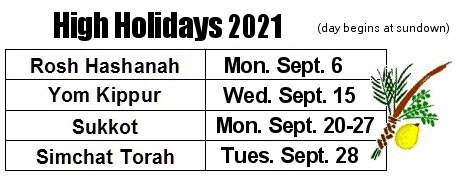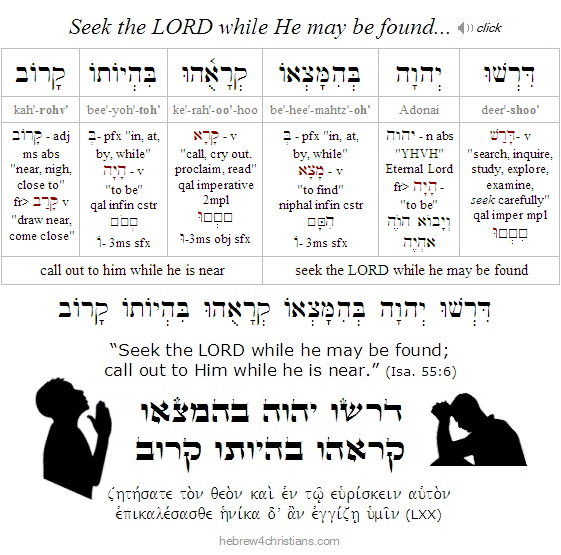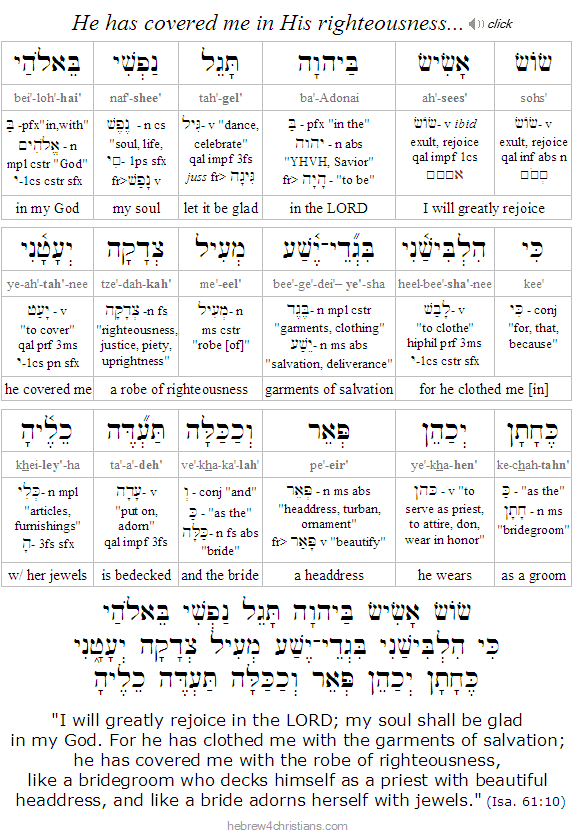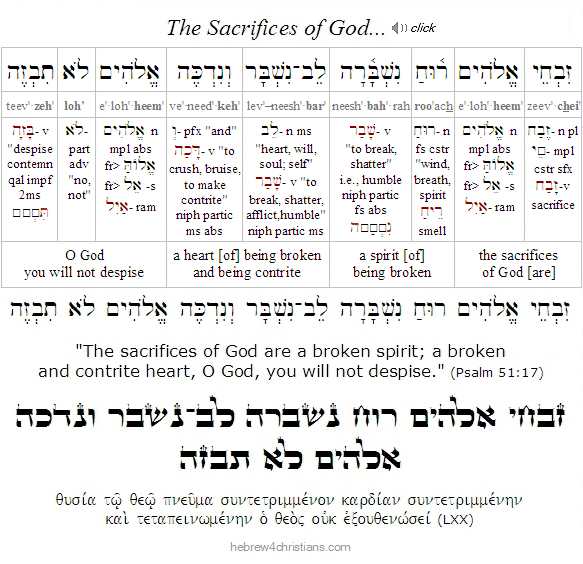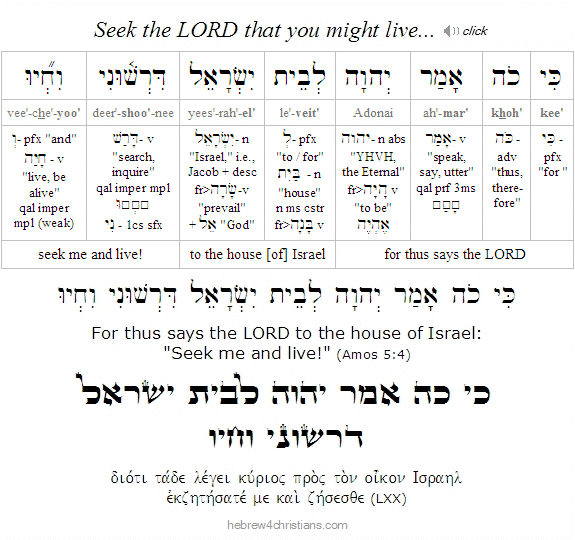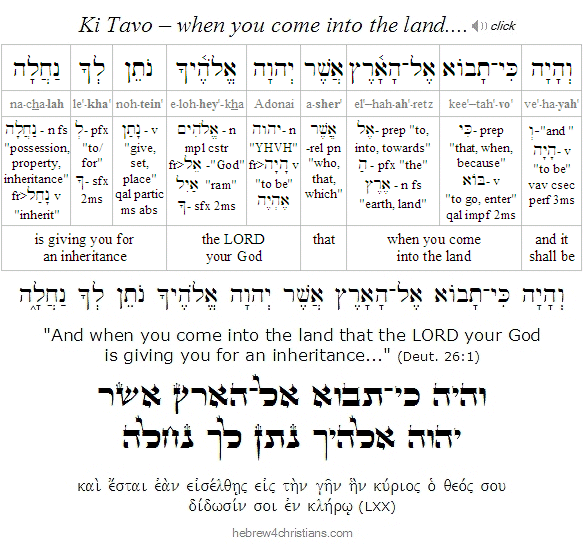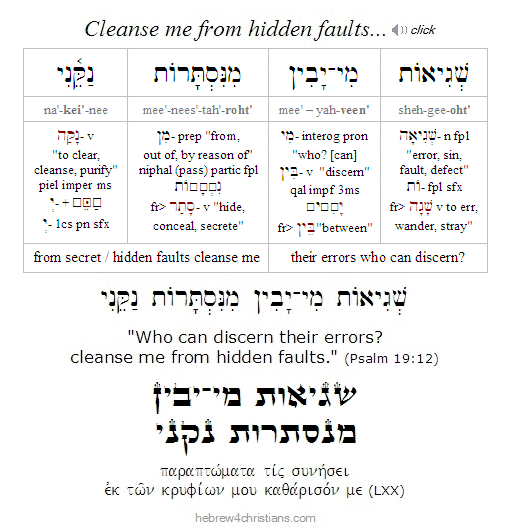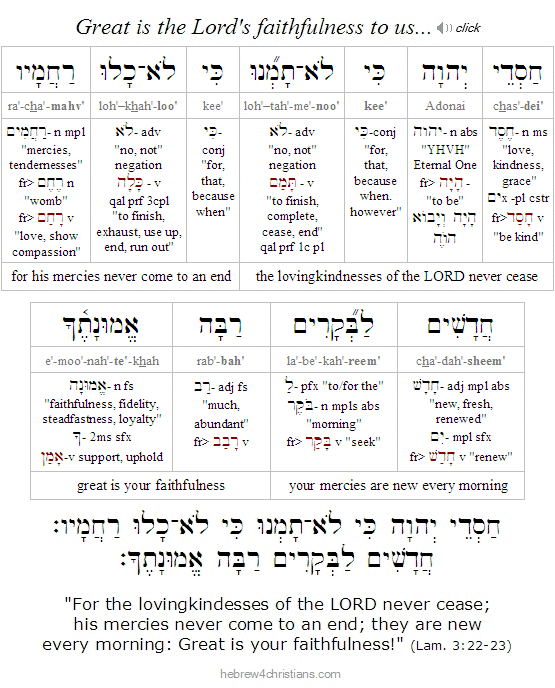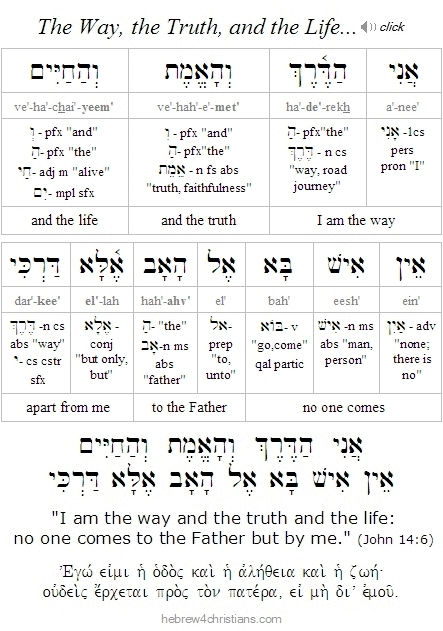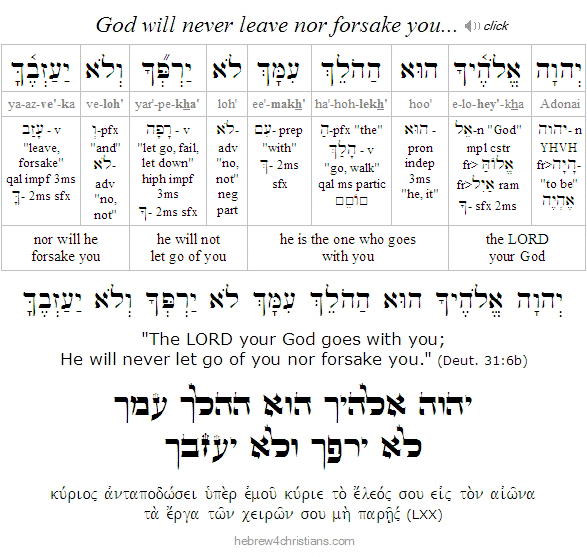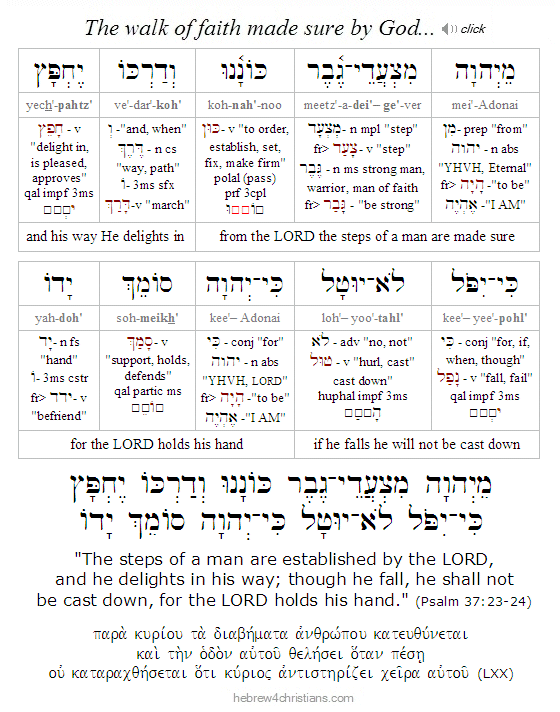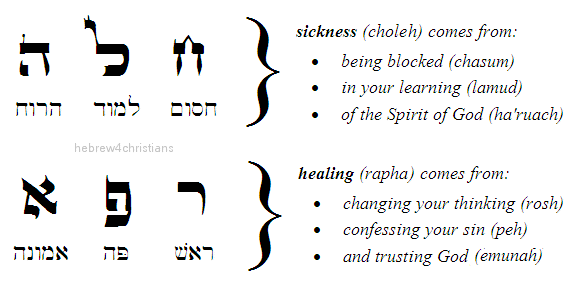|
Jewish Holiday Calendar
For August 2021 site updates, please scroll past this entry....
The Torah divides the calendar into two symmetrical halves: the Spring and the Fall, indicating the two advents of Messiah. The Biblical year officially begins during the month of the Passover from Egypt (called Rosh Chodashim, see Exod. 12:2), and the spring holidays of Passover, Unleavened Bread, and Firstfruits both recall our deliverance from Egypt and also our greater deliverance given by means of the death, burial, and resurrection of the Messiah, the great Passover Lamb of God. Yeshua was crucified on erev Pesach, buried during Unleavened Bread, and was resurrected on Yom Habikkurim (Firstfruits). The holiday of Shavuot (i.e., "Pentecost") both commemorates the revelation of the Torah at Sinai as well as the revelation of the Ruach HaKodesh (Holy Spirit) at Zion, in fulfillment of the promise given by our Lord....
The intermediate months of summer end with the advent of the sixth month of the calendar, called the month of Elul, which recalls the time Moses interceded on behalf of Israel after the sin of the Golden Calf. To commemorate this time of our history, we likewise focus on teshuvah (repentance) in anticipation of Rosh Hashanah and especially in anticipation of Yom Kippur, the great "Day of Atonement." In Jewish tradition the 30 days of Elul are combined with the first ten days of the seventh month (called the "Days of Awe") to set apart "Forty Days of Teshuvah" leading up to the Day of Forgiveness for Israel. Immediately following Yom Kippur, the mood changes as we begin preparing for a joyous week-long celebration called Sukkot (i.e., "Tabernacles") that concludes with the holiday of Simchat Torah.
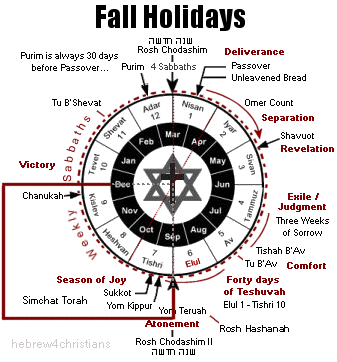 |
The Fall Holidays:

The fall festivals prophetically indicate the Day of the LORD, the second coming of Yeshua, the great national turning of the Jewish people, and the establishment of the reign of the Messiah upon the earth during the Millennial Kingdom in the world to come.
Note that in accordance with tradition, holiday dates begin at sundown. Moreover, some holidays may be postponed one day if they happen to fall on the weekly Sabbath:
1. Month of Elul (Sat. Aug. 7th [eve] - Mon. Sept. 6th [day])
2. Month of Tishri (Mon. Sept. 6th [eve] - Tues. Oct. 5th [day]) - Fall holidays here!
3. Month of Cheshvan (Tues. Oct. 5th [eve] - Thurs. Nov. 4th [day])
- Four Sabbaths: Noach, Lekh-Lekha, Vayera, Chayei Sarah
- Yom Ha'Aliyah - Honoring Israel's immigrants (Wed. Oct. 13th; Cheshvan 7)
- Sigd - 50th day after Yom Kippur; Ethiopian Jewish holiday Wed. Nov. 4th)
Note: For more about the dates of these holidays see the Calendar pages....
August 2021 Updates
Note: If any page content appears to be missing, please refresh the page...
Turning back to God...
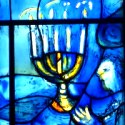
08.31.21 (Elul 23, 5781) The theme of the High Holidays is teshuvah (תְּשׁוּבָה), a word often translated as "repentance," though it is more accurately understood as turning back (i.e., shuv) to God. In spiritual terms, teshuvah may be regarded as a practical turning away from evil and a turning toward the good, though it is simpler to regard turning to God as the means by which we turn away from evil. Indeed the Greek word translated repentance (i.e., μετάνοια) means going beyond our habitual thinking, changing our mind, and learning to see from a radically new perspective. As we turn to God, we see that "everything is new."
Teshuvah, or "repentance," believes that the kindness of God can give life to our dead hearts, and therefore it is first of all a matter of faith, trusting God to perform the miracle for us. However, even though it is a great gift from heaven, repentance requires honesty and acknowledgment of the truth. We must confess our inner poverty, our neediness, and mourn over the loss and harm caused by our sin (Matt. 5:2-8). Repentance turns away from our attempts to defend or justify ourselves and instead turns to God to heal our separation from Him (Rom. 8:3-4). Teshuvah buries our old nature by being made into a new creation.
It is no small thing to believe the message of Yeshua, and indeed, it involves a passionate inwardness that "scandalizes" the rational mind. Our father Abraham is extolled as the model of righteous faith, but he was tested to sacrifice the moral law (e.g., "thou shalt not murder") when he lifted up the knife to slay his beloved son Isaac. Faith requires you to change your everyday thinking, to go beyond natural expectations, to "walk on water." In the case of Yeshua, we are confronted with the "Absolute Paradox," namely, the God-Man, the Infinite-made-Finite, the Holy-made-Profane, the Sinless-made-Sin, who says to you: "I AM the resurrection and the life. Whoever believes in me, though he die, yet shall he live, and everyone who lives and believes in me shall never die. Do you believe this?" (John 11:25-26). You will never die; you will never hunger; you are made whole through my brokenness; you will be cleansed by my defilement, and so on. It's not just hard to believe, it's impossible, which is why it is a miracle of God to be saved (Matt. 19:26). "It is the Spirit that gives life; the flesh is no help at all" (John 6:63). The difference is Yeshua: "Salvation is of the LORD." We are enabled to love and know God by means of his inner life and spirit, not by means of good intentions or religious zeal. Faith itself is a miracle, the power of God.
Teshuvah of Brokenness...
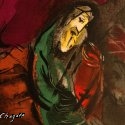
08.31.21 (Elul 23, 5781) Regarding the call to do teshuvah the LORD appeals: "Come back to me with all your heart (בְּכָל־לְבַבְכֶם) - with fasting, with weeping, and with mourning - and rend your hearts and not your garments, and return to the LORD your God (וְשׁוּבוּ אֶל־יְהוָה אֱלהֵיכֶם), for he is gracious and merciful, slow to anger, and abounding in love..." (Joel 2:13). Genuine teshuvah (repentance) is not about the "outer layers" of life, but engages the deepest depths of heart; it is not expressed in religious practices or rituals but in personal brokenness and utter desperation... As King David said, "the sacrifices of God are a broken spirit (רוּחַ נִשְׁבָּרָה); a broken and contrite heart (לֵב־נִשְׁבָּר וְנִדְכֶּה), O God, you will not despise" (Psalm 51:17). As is written in our Haftarah portion for Shabbat Shuvah: "Return O Israel (שׁוּבָה יִשְׂרָאֵל), to the LORD your God, for you have stumbled because of your iniquity; take with you words and return to the LORD (וְשׁוּבוּ אֶל־יְהוָה) and say to him, 'Take away all iniquity; accept what is good, and we will pay with bulls the vows of our lips'" (Hos. 14:1-2).
Note that the appeal to the LORD as "gracious and merciful, slow to anger, and abounding in steadfast love" (חַנּוּן וְרַחוּם הוּא אֶרֶךְ אַפַּיִם וְרַב־חֶסֶד) recalls the meaning of YHVH (יהוה) revealed to Moses in his state of brokenness over the sin of the Golden Calf (Exod. 34:6-7).
Hebrew Lesson:
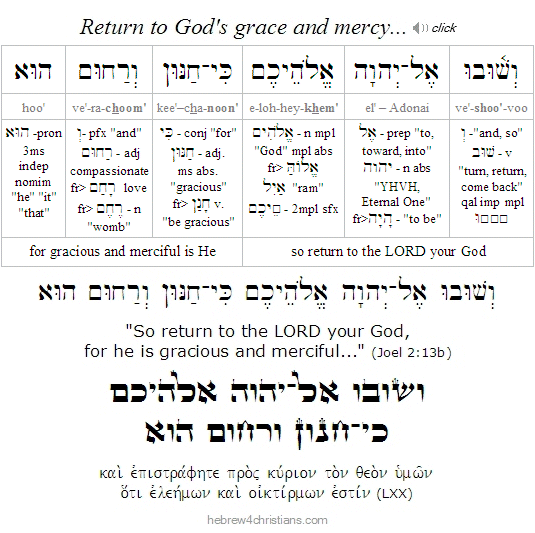 |
Yeshua and Rosh Hashanah...
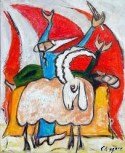
08.31.21 (Elul 23, 5781) As I've mentioned over the years, the word "love" (i.e., ahavah) first appears in the Torah regarding Abraham's passion for his son: "Take your son, your only son Isaac, whom you love (אֲשֶׁר־אָהַבְתָּ), and go to the land of Moriah, and offer him there as a burnt offering on one of the mountains of which I shall tell you" (Gen. 22:2). After journeying three days to the designated place, Abraham told his son that God himself would provide a lamb (אֱלהִים יִרְאֶה־לּוֹ הַשֶּׂה), and then bound Isaac, laid him upon an altar, and raised his knife to slay him (Gen. 22:8-10). At the very last moment, the Angel of the Lord called out: "Abraham! Abraham! Do not lay your hand on the lad or do anything to him, for now I know that you fear God, seeing you have not withheld your son, your "only son" (בֵּן יָחִיד), from me" (Gen. 22:11-12). Abraham then "lifted up his eyes" and saw a ram "caught in a thicket" which he offered in place of his son. Abraham then named the place Adonai-Yireh (יהוה יִרְאֶה), "the LORD who provides" (Gen. 22:14). The sacrifice of the lamb for Isaac portrayed the coming sacrifice of Yeshua, the great "Lamb of God" (שֵׂה הָאֱלהִים) who would be offered in exchange for the trusting sinner (John 1:29). Indeed the story of how God provided the lamb at Moriah (and later during the Passover in Egypt) foreshadowed the greater redemption given in Messiah at the "Passover cross," and may be understood as the "Gospel according to Moses" (Luke 24:27; John 5:46). Therefore, during Rosh Hashanah, the Day of Judgment (יוֹם הַדִּין), we listen to the sound of the shofar (ram's horn) to remind us of the provision of Lamb of God given in place of Isaac... In other words, Rosh Hashanah is decidedly a holiday that commemorates and celebrates Yeshua our Messiah...
Hebrew Lesson:
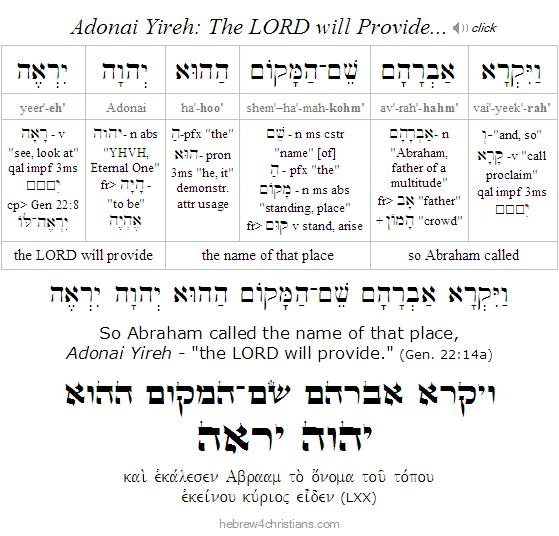 |
Tradition and Rosh Hashanah...
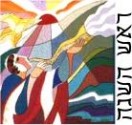
[ The holiday of Rosh Hashanah begins a week from today, September 6th at sundown... ]
08.30.21 (Elul 22, 5781) Though the term "Rosh Hashanah" (ראש השנה) does not explicitly occur in the Torah, the beginning of the 7th month (i.e., Tishri 1) is clearly to be set apart as "Yom Teruah" (יום תרועה), a day of shofar blowing (see Lev. 23:24-25, Num. 29:1-2). When we consult Jewish tradition for some additional insight about what this means, we discover that the sages and great commentators of the Torah universally regarded the number seven as the number of completeness. Just as the seventh day of the week was considered sacred, so too is the seventh month of the year. Therefore the sages reasoned that since each new moon (rosh chodesh) is regarded as a sacred time (see Num. 10:10), it's logical that the seventh new moon (counting from Nisan in the spring) should acquire special sanctity. This conclusion seems especially justified in this case because God directly commanded Israel to sanctify the seventh month as a solemn day of "remembrance and shofar blowing" (זִכְרוֹן תְּרוּעָה). Therefore while it is clear that the new moon of the seventh month is to be observed as "Yom Teruah," it nevertheless has a somewhat "concealed" significance, suggestive of the absence of the moon on that date itself...
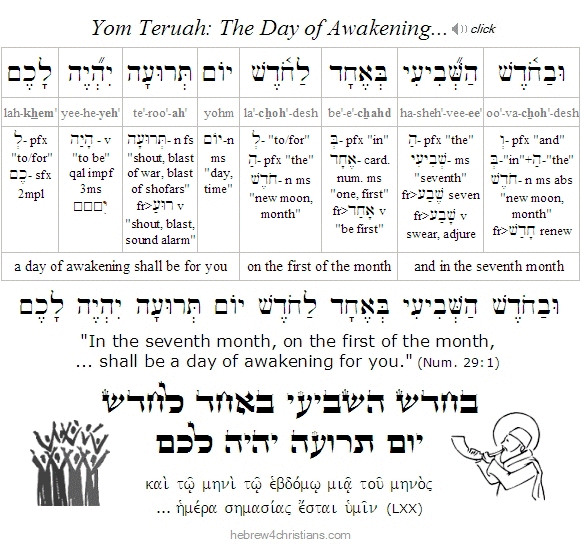 |
Note, however, that the Torah calls the end of the harvest year (in the fall) the "end of the year" (i.e., חַג הָאָסִף בְּצֵאת הַשָּׁנָה, see Exod. 23:16), which implies both the start of a new year and the symmetry of the calendar: the fall festivals "mirror" the spring festivals and correspond to one another. Just as there is a "new year" in the spring, on the new moon of Nisan, so there is in the fall, on the new moon of Tishri, the seventh month... The Psalmist likewise regarded the new moon of the seventh month as especially significant (Psalm 81:3-4). And after the return of the exiles, Ezra the Scribe gathered the people at the Water Gate in Jerusalem on the first of Tishri to read the Torah before the people (see Neh. 8:1-9). Ezra's action may have been the precedent among the later sages for investing Tishri 1 with its distinctive status. That is why we make a "teruah" shout of thanks to God in anticipation of the fulfillment of God's promises and redemptive purposes during the End of Days.
The question about Rosh Hashanah has to do with the authority of Jewish tradition itself. Does the Jewish community have sanction to establish the date of Hebrew calendar? To establish the start of the month? To determine if a year was shemittah (a sabbatical year)? To sound the shofar and declare a Jubilee? According to Moses, the answer is a qualified "yes." After all, it's clear that Moses established judges and courts to determine such matters and to develop case law based on the precepts of the Torah (e.g., see Deut. 16:18). This "chain of authority" was later codified by the sages of the Mishnah, who said it was given by God first to Moses, then Joshua, then to the 70 elders, then to the prophets, and then to Ezra and the men of the Great Assembly (Pirke Avot 1:1). And according to "mainstream" Jewish tradition, Tishri 1 has been established as a "rosh hashanah" from at least the time of the return of the exiles (4th century BC). This is further attested by Flavius Josephus (first century AD) who wrote: "Moses ... appointed Nisan ... as the first month for the festivals ... the commencement of the year for everything relating to divine worship, but for selling and buying and other civil affairs he preserved the ancient order [i. e. the year beginning with Tishri]" (Antiquities 1.81). Even Yeshua Himself endorsed Ezra's division of the Scriptures into the "Law, Writings, and the Prophets" and said that not a "jot or a tittle" (kotzo shel Yod) would pass from the Torah until all was fulfilled (Luke 24:44; Matt. 5:18).
That said, there are undoubtedly a lot of Rabbinical "additions" that have accrued to the holiday over the centuries, especially since the destruction of the Second Temple. Despite this, hovever, let me suggest that many of the traditions of Rosh Hashanah can be genuinely helpful for us. For instance, undergoing self-examination and doing teshuvah are commanded by God and inherently valuable exercises for followers of Yeshua (see Lam. 3:40; Haggai 1:5; Psalm 119:59; Matt. 7:3-5, Gal. 6:3-4, 1 Cor. 11:28, 2 Cor. 13:5, James 5:16, 1 John 1:8-9, etc.). Setting aside 40 days each year to help us turn away from sin is a healing custom, especially if it's done in light of truth of the gospel message. After all, Christians will stand before the Throne of Judgment (kisei ha-din) to give account for their lives to God (see 2 Cor. 5:10). As it is written: "Every man's work shall be made manifest: for the day shall declare it, because it shall be revealed by fire; and the fire shall try every man's work of what sort it is" (1 Cor. 3:13). The foundation of every true work of God comes from trusting in the finished work of Yeshua the Messiah, and the work of our faith will be tested and judged. We have great consolation in our testings, friends: if we are honest with the Lord and appeal to Him for help, He promises to be there for us (Heb. 4:15-16).
For more on this subject, see Is Rosh Hashanah Biblical?
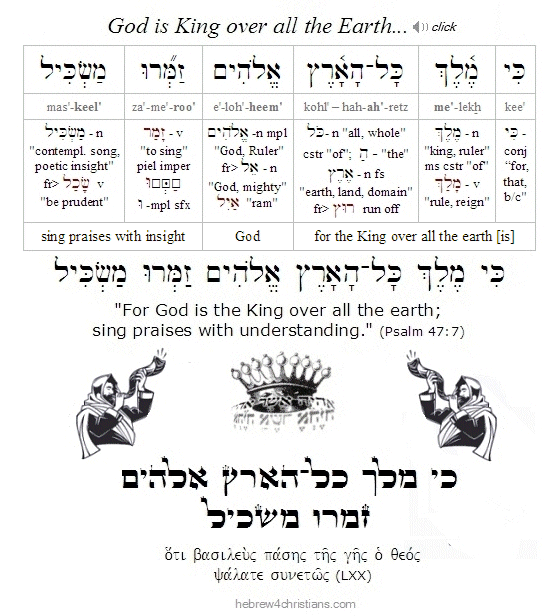 |
Come just as you are...

08.30.21 (Elul 22, 5781) Some people seem to think that we first must repent and then we will encounter the Lord, but it's actually the other way around: we first encounter the Savior and then we learn the meaning of repentance. Thus Paul's eyes were opened after he was first blinded by the light (Acts 9:3-6). Likewise, it is only after we have met the Lord that we begin to understand our own blindness of heart, but as learn to see more clearly, we encounter more and more of his love (Rom. 5:20). As Yeshua said, "My yoke is pleasant (χρηστὸς) and my burden is light (Matt. 11:30). Teshuvah, then, is a progressive and ongoing process of awakening, as we learn to love God and to accept ourselves, despite our struggle with sin. As St. Anselm once prayed: "O Lord, grant us grace to desire thee with all our hearts, that so desiring, we may seek and find thee, and so finding thee, may love thee, and loving thee may hate those things from which you have redeemed us." Amen.
We encounter the Lord "just as we are," by means of his gracious intervention in our lives, and so we continue to live by faith in God's grace (indeed, what we call "sanctification" is often just "catching up" with the miracle of his revelation to us). And we always come to God "just as we are," since we are never more than what we are in the truth: χάριτι δὲ θεοῦ εἰμι ὅ εἰμι- "by the grace of God I am what I am," as Paul said. "For all things come from You, and from your hand we give back to you" (1 Chron. 29:14). Therefore the Spirit says, "Come unto me just as you are, or you may never come at all...."
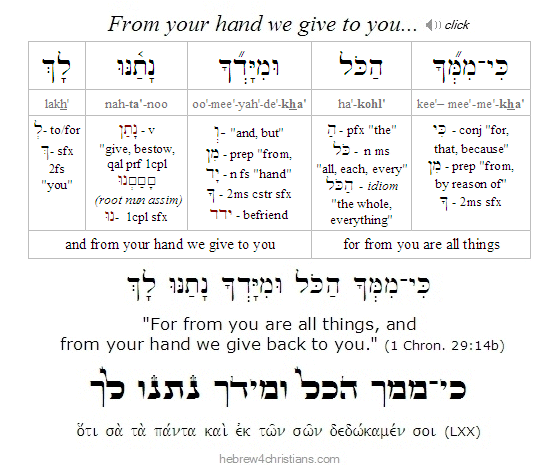 |
A prayer to the One calling you to come: "I come to you just as I am - needy, sick within, weary, and broken... I come seeking your love; I come because you invited me to come: I open my heart, such as it is, to you; please join me here, in this place of my need, in this place of pain, and wrap me your comfort. I can only love you as I know your love, Lord Yeshua, so please help me to know your love in the truth. Amen."
Spelling out "Teshuvah"

08.30.21 (Elul 22, 5781) The central message of the Scriptures is to turn to God for life. Rabbi Sussya once said: "There are five verses in the bible that constitute the essence of the Torah. These verses begin in Hebrew with one of these letters: Tav (תּ), Shin (שׁ), Vav (ו), Bet (בּ), and Hey (ה), which form the word for repentance, "teshuvah" (תְּשׁובָה). The five verses are 1) Tamim tiheyeh (תָּמִים תִּהְיֶה): "Be wholehearted before God" (Deut. 18:13); 2) Shiviti Adonai (שִׁוִּיתִי יְהוָה): "I have set the LORD always before me" (Psalm 16:8); 3) Va'ahavta lere'akha (וְאָהַבְתָּ לְרֵעֲךָ): "Love your neighbor as yourself" (Lev. 19:18); 4) Bekhol derakekha (בְּכָל־דְּרָכֶיךָ): "In all your ways know Him" (Prov. 3:6); and 5) Higid lekha (הִגִּיד לְךָ): "Walk humbly with your God" (Micah 6:8). In other words, the way of teshuvah, of answering God's call for you to return to Him, is to sincerely set the LORD before you, to love others, and to walk out your days in heartfelt gratitude.
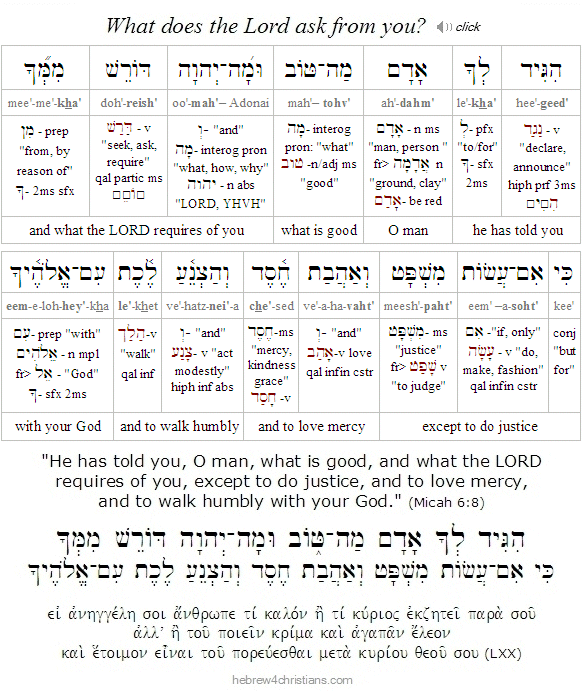 |
In other words, "teshuvah" (repentance) is an acronym that stands for being whole, seeing God, loving others, knowing God in all your journey, and walking in humility...
Last Sabbath of the Year 5781...

[ Yom Teruah (i.e., "Rosh Hashanah") begins this coming Monday, Sept. 6th at sundown... ]
08.30.21 (Elul 22, 5781) The last month of the Jewish calendar (counting from Tishri) is called Elul (אֱלוּל), which began this year August 7th (at sundown). Traditionally, this final month of the calendar marks the beginning of a forty day "Season of Teshuvah" that culminates on the solemn holiday of Yom Kippur. The month of Elul is therefore a time set aside each year to prepare for the Yamim Nora'im, the "Days of Awe," by getting our spiritual house in order.
The haftarah for parashat Nitzavim (i.e., Isa. 61:10-63:9) numbers the last of the seven readings from the prophets that are consecutively read before Rosh Hashanah. These "haftarot of comfort" foretell of the restoration of the Jewish people and of the coming of the Messianic Era. In this week's reading, the future salvation of the nation of Israel is described. The LORD promises to shine His glorious light upon the Jewish people and to reveal His glory, despite the hour of darkness and tribulation that comes upon the earth.
"I will greatly rejoice in the LORD; my soul shall be glad in my God. For he has clothed me with the garments of salvation; he has covered me with the robe of righteousness, like a bridegroom who decks himself as a priest with beautiful headdress, and like a bride adorns herself with jewels. For just as the ground produces its crops and a garden yields its produce, so the sovereign LORD will cause deliverance to grow, and give his people reason to praise him in the sight of all the nations. (Isa. 61:10-11)
The great Day of the LORD and time of judgment on the nations draws near, and Zion's deliverance is fully assured. All of the covenant promises of God given to Israel will be fulfilled. God will finish the work of redemption promised to the Jewish people.
Hebrew Lesson:
Nitzavim and Rosh Hashanah...
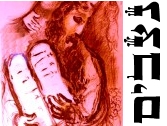
[ Yom Teruah (i.e., "Rosh Hashanah") begins this coming Monday, Sept. 6th at sundown... ]
08.29.21 (Elul 21, 5781) Our Torah reading for this week, parashat Nitzavim (פרשת ניצבים), is always read on the Sabbath before Rosh Hashanah, serving as a prelude to the holiday. The sages found an allusion to Rosh Hashanah in the opening verse: "You are standing today all of you before the LORD your God" (Deut. 29:10), where "this day" refers to Rosh Hashanah, when "all of you" shall stand before the LORD your God in judgment. The "last" shofar blast refers to Rosh Hashanah when the dead shall be raised (Rosh Hashanah 16b), whereas the "great" shofar blast is sounded at the end of Yom Kippur, after Israel has received the atonement.
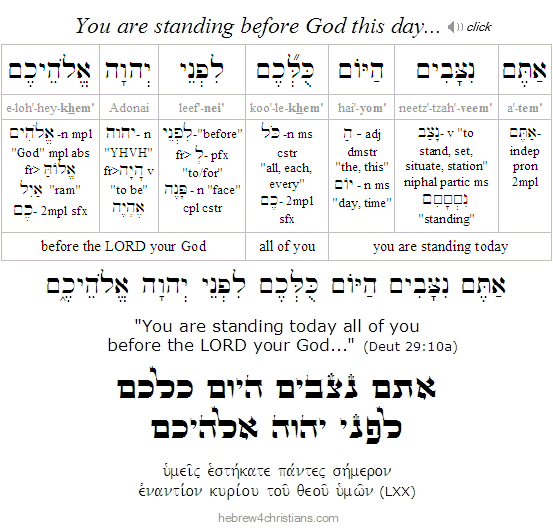 |
Rosh Hashanah has long been associated with the Day of Judgment (יום הדין) in Jewish tradition. According to many of the sages, the time immediately preceding the appearance of the Messiah will be a time of testing (nisayon) in which the world will undergo various forms of tribulation called chevlei Mashiach (חֶבְלֵי הַמָּשִׁיחַ) - the "birth pangs of the Messiah" (Sanhedrin 98a; Ketubot, Bereshit Rabbah 42:4, Matt. 24:8). Some say the birth pangs are to last for 70 years, with the last 7 years being the most intense period of tribulation -- called the "Time of Jacob's Trouble" / עֵת־צָרָה הִיא לְיַעֲקב (Jer. 30:7). The climax of the Great Tribulation is called the great "Day of the LORD" (יוֹם־יהוה הַגָּדוֹל) which represents God's wrath poured out upon a rebellious world system. On this fateful day, the LORD will terribly shake the entire earth (Isa. 2:19) and worldwide catastrophes will occur. "For the great day of their wrath has come, and who can stand?" (Rev. 6:17). The prophet Malachi likewise says: "Surely the day is coming; it will burn like a furnace. All the arrogant and every evildoer will be stubble, and that day that is coming will set them on fire,' says the LORD Almighty. 'Not a root or a branch will be left to them'" (Mal. 4:1). Only after the nations of the world have been judged will the kingdom of God (מַלְכוּת הָאֱלהִים) be established upon the earth. The remnant of Israel will be saved and the 1,000 year reign of King Messiah will then commence (Rev. 20:4). For more information, see "As the Day Draws Near."
Shavuah Tov Podcast:
Parashat Nitzavim..
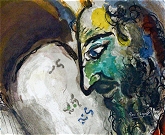
Trust in Difficult Days...
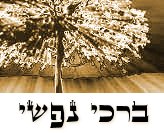
08.27.21 (Elul 19, 5781) We are living in times of difficulty leading up to the coming of our Messiah, Yeshua, and therefore we all need courage and grace to persevere. When Andrew Murray was bedridden and sick, he advised another sufferer using these words: "In time of trouble say: "First, He brought me here. It is by His will I am in this straight place; in that I will rest. Next, He will keep me here in His love, and give me grace to behave as His child. Then, He will make the trial a blessing, teaching me the lessons He intends me to learn, and working in me the grace He means to bestow. Last, In His good time He can bring me out again – how and when He knows. [Therefore] let me say I am here, (1) by God's appointment; (2) in his keeping; (3) under His training; and (4) for His time."
Deep within I discover that I can bless the Lord, losing sight of myself and my fears as I affirm my deepest purpose and heritage: "My (boundary) lines have fallen to me in pleasant places; indeed, my inheritance is beautiful to me" (Psalm 16:6). Though I might have felt bereft and even tempted to curse my estate, by God's grace I am made able to give thanks and to bless, even in the midst of my troubles and pain: "I will bless the LORD who has counseled me; my conscience disciplines me in the night" (Psalm 16:7). Therefore שִׁוִּיתִי יְהוָה לְנֶגְדִּי תָמִיד - "I have set the Lord always before me" – especially in desperate moments when I can barely endure – since I have learned that "because he is at my right hand, I shall not come undone" (Psalm 16:8). God gives me strength to renew my hope: therefore "my heart is made glad, my whole being rejoices, and my body rests in trust" (Psalm 16:9). Amen, Shabbat Shalom!
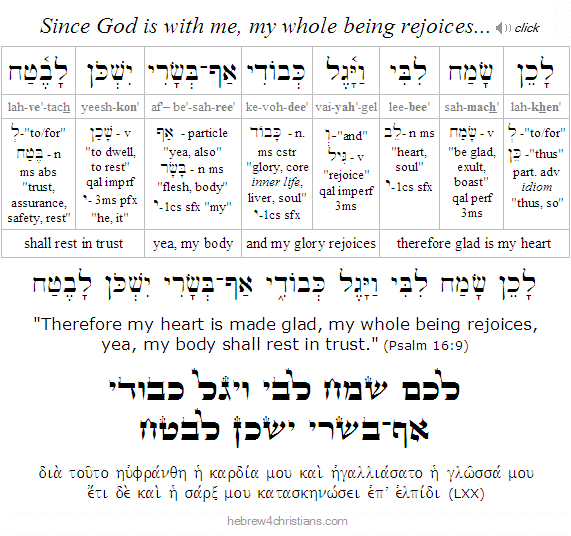 |
When I feel hopeless, I seek hope; when in pain, I seek strength; when in despair over besetting sins, I yearn again for a place I can call home... In the midst of these things, my heart wonders whether my suffering has come because I deserve it or somehow "need" it. I reason that it may make sense that God extends special care for his favored ones, for those who are righteous and who seem free from the vexation of despair, but does it make sense for me, one who is undone, broken, alone, and unworthy? My heart protests that this is not the whole story of my life, and that more to be said. I need God and I know that he cares for me. I recall his promises to heal, to bind up the broken of heart, and extend his comfort for our afflictions. Might pain herald the advent of something new to come? Might there be a deeper beauty and surpassing grace going "through the wound" instead of objecting to it?
As Sheep to the Slaughter...
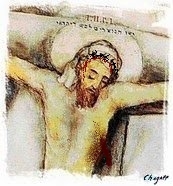
08.27.21 (Elul 19, 5781) In this present world it's a struggle not to be afraid... We see through a glass darkly; our heart's desire is often thwarted; we often walk in uncertainty; our prayers may seem to go unanswered. There are many tribulations, sorrows, and pains; we are grieved and often feel lonely; we sometimes struggle to hold fast to our confession and hope; we feel alarmed over the insanity and depravity that pervades the culture around us; we feel powerless to stop the juggernaut of unrestrained evil, yea, we lament over the battle within our own hearts -- our own inner fears, outrage, and wretchedness. We may wonder why God does not directly intervene to help in the midst of our plight; we may pray anguished prayers beseeching heaven's intervention to deliver us from evil. Many of our brothers and sisters around the world are undergoing persecution, being murdered for the sake of their faith; others languish in prison or "reeducation" camps, being labeled as "enemies of the State," brutalized, ostracized, marginalized, rejected, and forsaken of the common welfare of others. We shed tears over the burning of churches; we are repulsed by acts of violence against God's people; we protest that Christians are regarded as political enemies for honestly questioning the logic and veracity of governmental mandates. We are often misunderstood, or worse, vilified for honoring the truth. We are made outsiders, segregated outside the camp, maligned as lepers and deplorables... Indeed, the world system hates us, and for the sake of our faith "we are being killed all the day long; we are regarded as sheep to be slaughtered" (Psalm 44:22; Rom. 8:36).
We may sometimes wonder where God is in the midst of our alienation and tribulation. As followers of Yeshua we are called to walk in the truth, to do justice, and to walk humbly with our God. More: we are to die to ourselves, love our enemies, and be faithful to God even in martyrdom. In these darkened days, however, this means walking through the the darkness of the valley of the shadow of death, for it is apparent that worldly culture has decisively rejected the truth of God and regards those who esteem it as its enemies. "The kings of the earth set themselves, and the rulers take counsel against the Lord, and against his Messiah, saying 'Let us break their bonds apart and cast away their cords from us'" (Psalm 2:3-4). Prophetically, we know what is on the horizon; we foresee the terrors of the "End of Days."
The test of faith in our circumstances, as has always been for God's people, is to remain steadfast in our conviction of God's love despite the darkness that surrounds us (Isa. 50:10). The test is summed up by C.S. Lewis this way: "We're not doubting that God will do the best for us; we're wondering how painful the best will turn out to be" (Collected Letters). We can't stay in the limbo of such questioning forever, however; we must shake off our misgivings and find settled determination to press on in faith: Our Lord has a crown and a kingdom prepared for us, and he will give us what we need in the way to attain unto it.
There is a difference between knowing about God in your head and knowing God in your heart... Unlike a merely intellectual idea of faith that merely assents to theological propositions or creeds, trusting in the Lord (i.e., bittachon: בִּטָחוֹן) is an emotional commitment to God's presence in the midst of the sorrows of our lives; it is the struggle of hope that affirms we are not finally alone, abandoned, helpless... Trust goes beyond the "head knowledge" to engage God personally, existentially, and from within the whirlwind of harrowing pain and pain's fearful loneliness. Authentic theology is "dialogical" -- a conversation of the heart with God - seeking, yearning, protesting, lamenting, and struggling with life's inscrutabilities and unfathomable questions as it appeals to God for the assurance and comfort of the Holy Spirit. Trust finds courage to voice to our sorrow and fears, inviting God into the midst of our brokenness, often yielding to tearful silence in unknowing expectation. As Dorothy Soelle wrote: "Prayer is an all-encompassing act by which people transcend the mute God of an apathetically endured reality and go over to the speaking God of a reality experience with feeling in pain and happiness" (Soelle: Suffering). This is perhaps the deepest meaning of the Shema - to listen for God's heart in the midst of your struggle; learning to encounter God's love in the place of your brokenness and need (Job 13:15).
Hebrew Lesson:
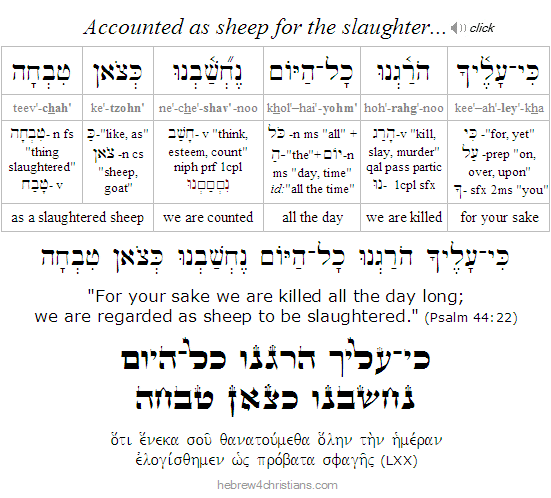 |
Reflecting on the role of suffering in the heart of faith, Dietrich Bonhoeffer (1906-1945) - who was murdered by the Nazis - once wrote: "Here is the decisive difference between Christianity and all religions. Man's religiosity makes him look in his distress to the power of God in the world: God is the deus ex machina [i.e., "quick fix"]. The Bible [on the other hand] directs man to God's powerlessness and suffering: only a suffering God can help" (Letters and Papers from Prison). Bonhoeffer's comment alludes to the difference between an "Elohim" (אֱלהִים) conception of God as the omnipotent power and Judge of reality, and the "YHVH" (יהוה) conception of God as the compassion Source and Breath of life - the Suffering God who empties himself to partake of our condition - to know our pain, to bear our sorrows, to heal us from the sickness of spiritual death, and to touch us in the loneliness of our exile... The Spirit enables us to "groan" in compassion, directing us away from the impulse to "kill the pain" to accept it as part of our lament and need for connection with God.
 |
Gaining Purity of Heart...

08.27.21 (Elul 19, 5781) Some people think of "purity of heart" in moral terms, such as not looking with lust on others, not coveting, etc., though these are really symptoms of disordered love... Genuine purity is a matter of focus, making a decision to believe the miracle in order to find the "good portion" and the "one thing necessary" (Luke 10:42). We "believe to see" (Psalm 27:13). Purity of heart therefore realizes that all that you've ever longed for is found in God alone. "There is but one good; that is God. Everything else is good when it looks to Him and bad when it turns from Him" (C.S. Lewis). It is a great, great gift from heaven to know God as your heart's true desire - to fully understand that your relationship with Him is the ultimate concern and treasure of your existence.
It is the Spirit that gives life (John 6:63). The Holy Spirit imparts the "pulse" of the Divine Life, and we gain newness of life when we trust God for purification from our sins through Yeshua our LORD. As King David further attested: Lev tahor bara li Elohim – "Create in me a clean heart, O God" and renew a spirit of 'yes' within me (Psalm 51:10). Only the new heart (lev chadash) created by the agency of God's Spirit can possibly yield the life of the Spirit within us. The miracle of a new heart transforms your whole inner nature - with the impartation of new appetites, new passions, new desires, and the rebirth of your will. If you struggle with being inwardly divided, fervently ask the LORD to give you the blessing of purity of heart...
Hebrew Lesson:
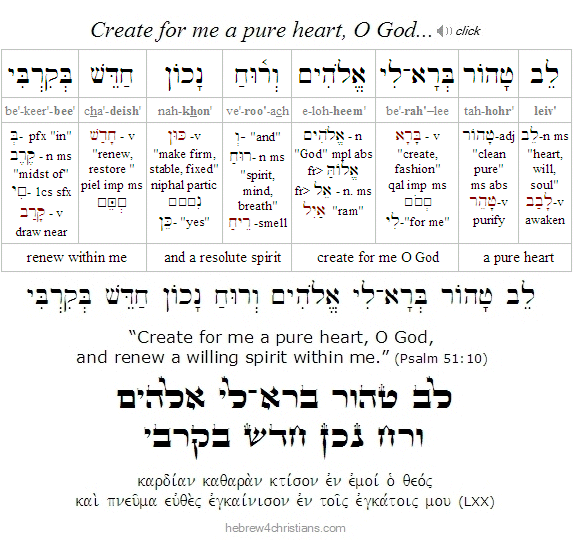 |
Teshuvah and Sin...

[ "There is but one good; that is God. Everything else is good when it looks to Him and bad when it turns from Him." - C.S. Lewis, the Great Divorce ]
08.27.21 (Elul 19, 5781) Many of us minimize the idea of sin because we fail to recognize it as life-threatening, lethal, and spiritually disastrous. Sin (and its justification in our lives) cuts us off from God, however, and that invariably leads to a sense of existential dread (Isa. 59:2; Ezek. 18:4). "The wages of sin is death" (Rom. 6:23), and that means those who practice sin are considered "dead" even while alive (Berachot 18a-b). Tragically, sin can lead to the dreadful punishment of karet (כָּרֵת), being "cut off" from any awareness of the Truth. Regarding this the sages note that the Hebrew word for sin, chet (חַטְא), is written with a silent Aleph (א) because when we sin, the Master and LORD (אַלּוּף) is present, because without his power no one could lift his hand to do anything great or small. Here we note the terrible reality that our sin is witnessed by God himself, a pain that pierces his very heart.
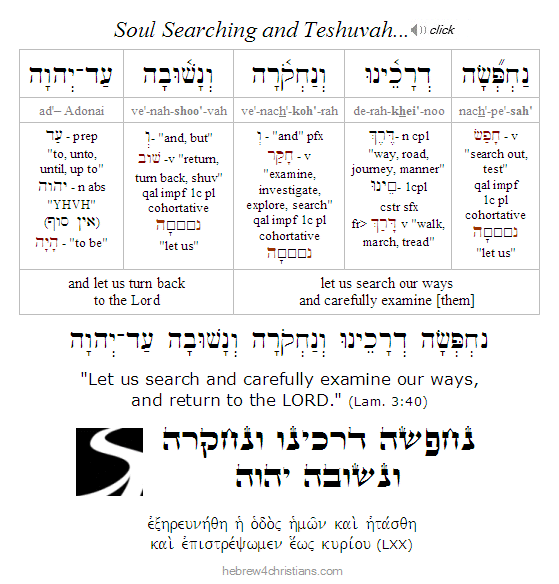 |
Rabbi Bunam told the parable of how a father made a loan to his son to help him start a business. When the time for repayment came, he learned his son had used the money wisely, and therefore he made him a gift of the amount loaned. Later the father did the same for another son, but when time for repayment came, he learned that the son had used the investment unwisely, so to prevent further losses, he compelled his son to give up the business. It is the same with us. God loans us the impulse to judge ourselves and repent of our unworthy deeds. If we use this impulse wisely, he gives us further resolve to walk in righteousness. But if we disregard the impulse and do nothing, God takes it back, and we remain stuck in our present condition (Rom. 1:28). May God help us turn to Him...
"Remember that the right direction leads not only to peace but to knowledge. When a man is getting better he understands more and more clearly the evil that is still left in him. When a man is getting worse he understands his own badness less and less. A moderately bad man knows he is not very good: a thoroughly bad man thinks he is all right. This is common sense, really. You understand sleep when you are awake, not while you are sleeping. You can see mistakes in arithmetic when your mind is working properly: while you are making them you cannot see them. You can understand the nature of drunkenness when you are sober, not when you are drunk. Good people know about both good and evil: bad people do not know about either"(C.S. Lewis).
Dangers of Self-Deception...
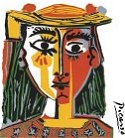
08.27.21 (Elul 19, 5781) When an enemy deceives you, he knows the truth about something and deliberately tries to conceal it from you. He may do this by telling you outright lies or by misleading your judgment in some way. This is called genivat da'at (גניבת דעת), or "stealing the mind." Regardless of the deceptive method used, however, once he defrauds you of the truth, you become subject to his manipulation and control. This is a common technique used by unconscionable advertisers, politicians, public health officials, critical race theorists, sexual revolutionaries, community organizers, and so on....
There is a different kind of deception, however, that is more insidious than being misled by an external enemy. This deception comes from within the heart and involves choosing to believe a lie, often for self-serving or self-flattering reasons. To be sure, it is paradoxical that we can knowingly lie to ourselves, but is quite a common practice, and it makes sense once you realize that the essence of the "self" is dialectical (i.e., dialogical), and that your soul finds its voice in the midst of an conversation it has within itself.
Self-deception is a universal problem of humanity. The Scripture declares: kol derekh ish yashar be'einav – "every person's way is right in his own eyes" – indicating that by nature we are self-justifying creatures, prone to believe our own "propaganda" and engage in wishful thinking. We are apt to be biased in our self-examination and ready to excuse ourselves at every turn, rationalizing our behavior and suppressing the truth about ourselves in order to quell the voice of conscience within our hearts. When faced with an inconsistency between our behavior and our fictional self-image, we often regard ourselves as something other than what we really are. We prefer the lie to the truth. In short, we deceive ourselves.
"If anyone thinks himself to be something, when he is nothing, he deceives (or seduces) himself" (Gal. 6:3). When we hide (or suppress) our true motives from ourselves, things become spiritual precarious... If we continue to squelch the inner voice of conscience and truth, we will become hardened, locked into a divided self in which the center does not hold... With no spiritual foundation within, we become lost to ourselves.
The remedy for self-deception is honest acceptance of ourselves as God sees us, since vetokhein libot Adonai – "the Lord weighs the heart." The Hebrew word for "weighs" is takhan, meaning to measure, balance, make even, or adjust to a standard. God's moral law functions as a "looking glass" of our inward condition, revealing both the divine standard of life required of us and also the truth of our own need for deliverance from ourselves.
It is only though the honest confession of our condition that we will find healing from the "divided self" – and thereby make our way right in the eyes of the Lord. As Yeshua said, you shall then know the truth, and "the truth shall make you free" (John 8:32).
Hebrew Lesson:
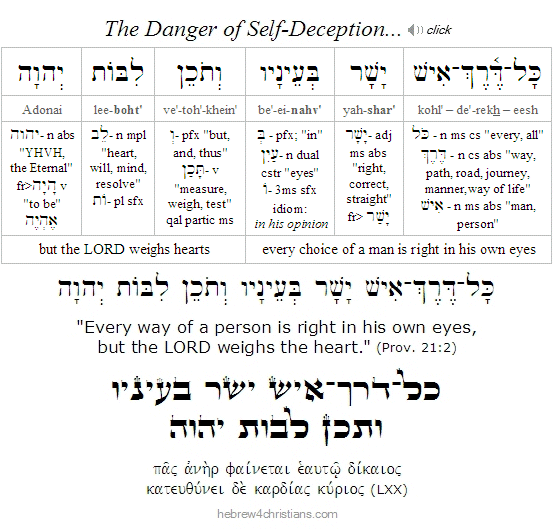 |
Brokenness and Service...

08.26.21 (Elul 18, 5781) The service of God requires the death of the ego (Luke 9:23). Rashi says that Aaron was still deeply ashamed over the Sin of the Calf, and that is why Moses urged his brother forward: "Draw near to the altar" (Lev. 9:7). And though Aaron felt inadequate and unworthy to be the High Priest of Israel, Rashi comments that he was chosen precisely because of this. His reluctance and sense of utter unworthiness was the very reason why he was granted the role of Israel's High Priest. Likewise you might feel unworthy of your high calling in the Messiah and yet you are called to come before the Divine Presence and function as God's holy priest, no less than Aaron (1 Pet. 2:9). You are chosen in your weakness; you are beloved because of your lowly standing; you are made "pure in heart" because you realize your own inner nothingness and need before the Savior.... Your brokenness is a gift that magnifies God's unending love and grace (1 Cor. 1:26-29).
The sages sometimes say that God is closer to sinners than to "saints." God in heaven holds each person by a string. When you sin, you cut the string; but then God ties it up again, making a knot - and thereby you are brought a little closer to him. Again and again your sins cut the string - and with each further knot God keeps drawing you closer and closer." (De Mello)
Courage to Believe...
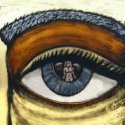
08.26.21 (Elul 18, 5781) In order to trust God, you must believe that you are valuable to Him and that He genuinely desires a relationship with you. You must accept that God has redeemed you to elevate your soul so that you could know and love Him. The spies could not transcend their slave mentality and therefore were unable to overcome the pain of their past; they continued to define themselves as victims... After scouting out the promised land, they confessed their sense of inadequacy: "we looked like grasshoppers to ourselves" (Num. 13:33). The spies felt small because they had forgotten the very reason for their redemption - they had overlooked their new identity as God's children. Their lack of self-respect made them feel unworthy of the inheritance. The sin of the spies was not that they doubted they could overcome the "giants in the land," but rather they doubted that God was really with them... Sadly the spies view of themselves was more real to them than God's view of them, and that is why they added, "and so we were (like grasshoppers) in their eyes."
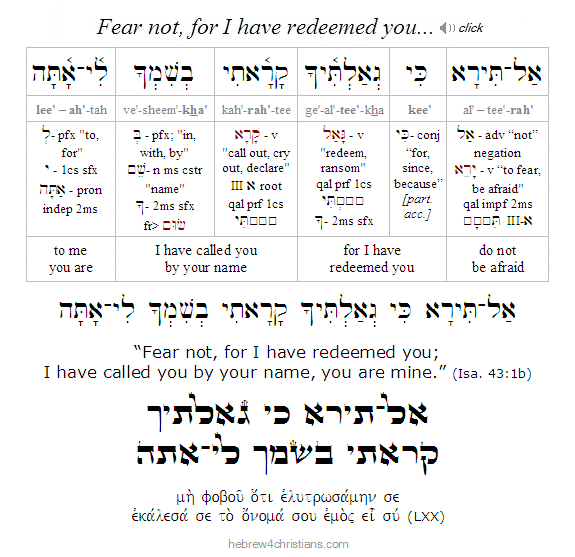 |
God's Radiant Light...

[ The following is related to the month of Elul and the theme of teshuvah (repentance)... ]
08.26.21 (Elul 18, 5781) In the Gospel of John it is recorded that Yeshua said, "I am the way, the truth, and the life" (i.e., ᾽Εγώ εἰμι ἡ ὁδὸς καὶ ἡ ἀλήθεια καὶ ἡ ζωή), no one can come to the Father apart from my hand" (John 14:6). The Greek word translated "truth" in this verse is aletheia (ἀλήθεια), a compound word formed from an alpha prefix (α-) meaning "not," and lethei (λήθη), meaning "forgetfulness." Truth is therefore a kind of "remembering" something forgotten, or a recollecting of what is essentially real. Etymologically, the word aletheia suggests that truth is also "unforgettable" (i.e., not lethei), that is, it has its own inherent and irresistible "witness" to reality. People may pretend or even lie to themselves, but ultimately the truth has the final word... "The light shines in the darkness, and the darkness has not overcome it" (John 1:5).
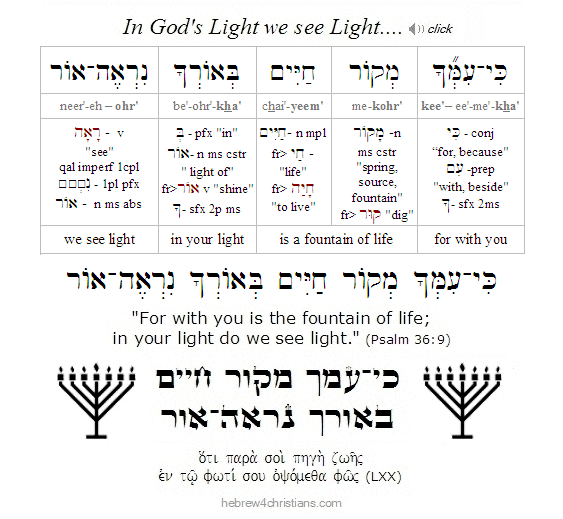 |
In God's light we see light... When you enter a dark room with a lamp, the darkness flees and is overcome by the light. So also with teshuvah: When we turn to the Lord spiritual darkness is overcome by the Divine Radiance. In Yeshua is life, the light of the world; those who receive Him behold ohr ha'chayim (אוֹר הַחַיִּים) - the "light of life."
During this Season of Teshuvah -- and always -- may the LORD God of Israel help us walk in the unforgettable and irrepressible radiance of His glory. May God help us shine with good works that glorify God's Name (Matt. 5:16). "For God, who said, 'Let light shine out of darkness' (יְהִי אוֹר וַיְהִי־אוֹר), has shone in our hearts to give the light of the knowledge of the Glory of God in the face of Yeshua the Messiah" (2 Cor. 4:6).
 |
Quick update: I have been very busy the last several days fixing broken audio links on the Hebrew grammar pages... This is very tedious work, actually, since the pages were corrupted from server outages and I have to re-code the links and in some cases re-record the Hebrew... O Lord, give me patience, but it give it me right now! ;)
Teshuvah of Hope...

[ The following concerns the "Season of Repentance" leading up to the High Holidays... ]
08.25.21 (Elul 17, 5781) "I go to prepare a place for you... on the other side of this veil; the place of my secret chamber. Look into my eyes before I go; see my heart's passion: I am aflame for you, and yet I must go; I must... There is no other way but through, through the waste places, into the darkest pitch, across that chasm... But don't let your heart be troubled, for this demonstrates my love and seals my word to you forever. And though we must be apart for a season, I swear I will come again for you, to take you through this veil to be with me forever. Do not lose heart, my beloved. I am coming soon; my hand is upon the door..."
Do you have trouble receiving these words as your own? Henri Nouwen keenly wrote: "There are two realities to which you must cling. First, God has promised that you will receive the love you have been searching for, and second, God is faithful to that promise." You must believe the "yes" that comes back when you ask, "Do you love me?" You must choose this "yes" even when you do not experience it" (Voice of Love). You have to trust the place that is solid, despite the gnawing sense of inner emptiness and the inevitable changes of life...
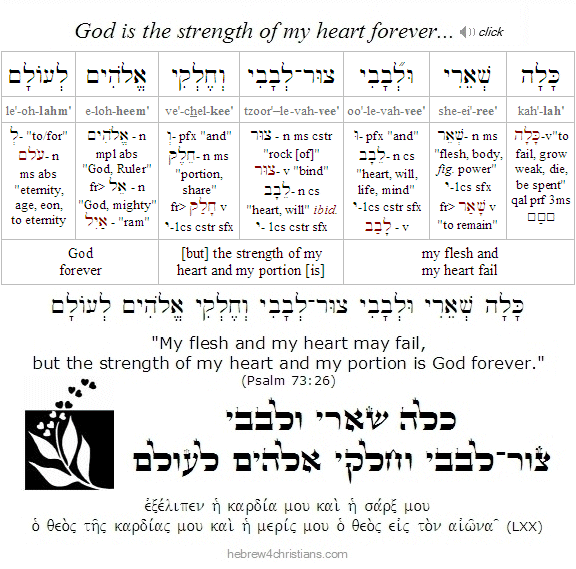 |
The High Cost for Apathy...
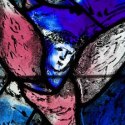
08.25.21 (Elul 17, 5781) From our Torah for this week (i.e., Ki Tavo) we read: "Cursed is anyone who does not uphold the words of this Torah to do them" (Deut. 27:26). This is because 1) God is God; 2) ultimate reality is non-negotiable, and 3) we are eternally accountable for all that we do (Matt. 12:36; Heb. 4:13). "Each person's deeds will become manifest, for the Day will disclose it, because it will be revealed by fire, and the fire will test what sort of deeds each one has done" (1 Cor. 3:13). There is a Scroll that attests the reality of all truth, and the life of every soul created by God is recorded therein (Rev. 20:12).
We are forbidden to add or subtract from Torah, since that is to refashion God's message into one of our own understanding (Deut. 4:2). Reading the tochachah or "rebuke" in our portion (i.e., Deut. 28:15-68) is difficult and painful, though it serves as a bitter medicine to wake us up from our lethal coma. In that sense the tochechah is a great blessing, since it shocks us into experiencing the "gravity of God's grace." This is why Yeshua proclaimed grave warnings about the dangers of forfeiting life and thereby "receiving" hell... Sin is a lethal problem, and we must turn to God for healing or we will die.
The Lord does not allow us to trifle with the truth, neither will he offer us a good that excludes Divine Reality since there simply is no such thing. God does not give us the option of affecting existential indifference toward Him, since apathy is as much a spiritual decision as is outright rebellion and apostasy. "If anyone thinks he has faith yet is indifferent toward this possession, is neither hot nor cold, he can be certain that he does not have faith. If anyone thinks he is a Christian and yet is indifferent toward being that, then he is not really one at all. Indeed what would we think of a person who gave assurances that he was in love and also that it was a matter of indifference to him?" (Kierkegaard). As King David inscribed upon his heart: "Guard me, O God, for in you I take refuge. I say to the Lord, "You are my Lord; I have no good apart from you" (Psalm 16:1-2).
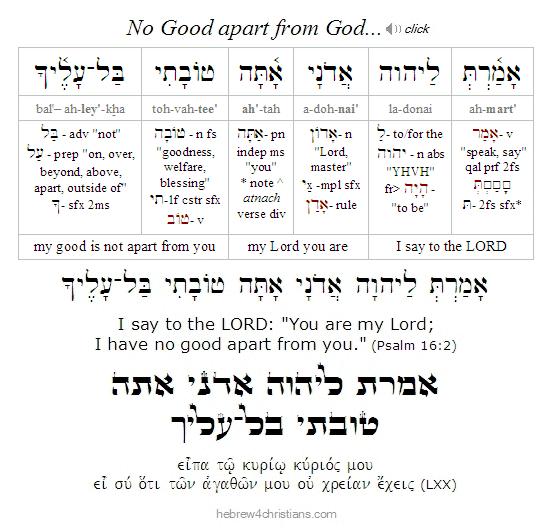 |
Teshuvah of Humility....

08.25.21 (Elul 17, 5781) Only Yeshua imparts eternal life to the trusting soul, enabling the heart to truly and radically change. However, to receive this utmost blessing, we must settle the question of our profound need for deliverance from our corrupt inner nature. We simply cannot hear the message of the gospel if we do not feel hopelessly trapped within the consciousness and conviction of our sin. If we believe that we must justify our own existence by means doing good or by means of religious practices, for example, we will likely turn against God by regarding him a taskmaster who demands too much from us. If however, we realize that we cannot please God apart from his merciful intervention in our hearts, we learn to let go and abandon ourselves to his mercies. Those who cannot fathom the grace of God, however, are consigned to go back "under the law" again and again until the question of their powerlessness is settled. Until that miraculous moment of awakening comes, however, the message of Yeshua will make little traction within the heart.
Grace often comes in disguise because the ego has to be humbled for the heart to confess its need. When the veil is pulled back, and we discover with a shock that we ourselves are evil, and that despite our ideals we need deliverance from our inner wretchedness, we begin to turn to God not merely for mercy, but for the miracle of transformation - a new kind of life, a new heart, a new spirit - freedom from the soul sickness that haunts us in our secret shame and self reproach.... It is when we are at the "end of ourselves" -- when we know in our bones that we must "find God or die" -- that we can turn to Yeshua for life.
It is hard for the "rich" to enter the kingdom of God; it is hard for those who are self-satisfied, who regard themselves as moral, righteous, and who pray: "Thank you God that I am not like other men" (Luke 18:11). Yeshua speaks to the "poor in spirit" and to those who mourn over their lost condition. Those who are blessed realize their great need for God's intervention in their lives. They understand that it is in brokenness that we find divine healing; it is in our weakness we find God's strength.
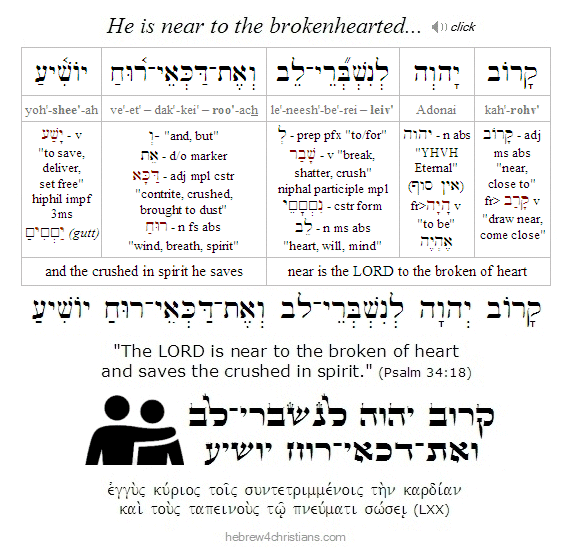 |
"God became a man to turn creatures into sons, not simply to produce better men of the old kind but to produce a new kind of man. It is not like teaching a horse to jump better and better, but like turning a horse into a winged creature" (Lewis: Mere Christianity). Amen. The divine name associated with teshuvah, or repentance, is ehyeh (אהיה), "I will be." The LORD imparts a holy and divine nature within us when are are reborn as his children. As it is written in our Scriptures: "Therefore, if anyone is in Messiah, he is a new creation (בריאה חדשׁה); the old has passed away; behold, the new has come" (2 Cor. 5:17).
Turn while you can...
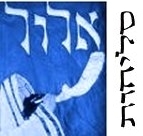
08.24.21 (Elul 16, 5781) Teshuvah, or turning to God for life, is - in the present hour - an act of faith, for faith "sees the invisible" and discerns God's presence even as if "through a glass darkly" (1 Cor. 13:12). However, in the end, when everything will be manifest and brought to the light -- every soul will be turned to face God, and consequently every soul will be compelled to confess the truth about who they are. As C.S. Lewis wrote: "In the end that Face which is the delight or terror of the universe must be turned upon each of us either with one expression or with the other, either conferring glory inexpressible or inflicting shame that can never be cured or disguised" (Weight of Glory).
Human beings have a moral imperative, given by God Himself, to receive the truth and to live according to the nature of spiritual reality. Those who reject or suppress the truth, however, are responsible for their actions, as it is written, "No one who practices deceit shall dwell in my house; no one who utters lies shall continue before my eyes" (Psalm 101:7).
Being honest with ourselves is absolutely essential for any sort of authentic spiritual life... "No person is saved except by grace; but there is one sin that makes grace impossible, and that is dishonesty; and there is one thing God must forever and unconditionally require, and that is honesty" (Soren Kierkegaard). Confession means "saying the same thing" about ourselves that God says - and that means not only acknowledging our various sins, transgressions, and iniquities, but also affirming our new identity as the beloved children of God. Saying that God doesn't love you is a lie as damning as denying His very existence... The great test of faith is whether you know in your heart that you are chosen, beloved, and forgiven by God, despite your many failures and sins.
Today is our opportunity to turn to God and find life. The Lord does not force us to choose life over death, though he does constrain us to choose, since being made in his image and likeness means that our choices are full of eternal and everlasting significance. When God finally appears at the end of the age, there will be no further call to choose to believe in his redemption, for the hour will be past, and our indifference will then mark our fate. Truth is the foundation of reality, and lying is therefore a form of denial of reality – a dangerous denial - since reality invariably proves self-authenticating (John 3:18).
Hebrew Lesson:
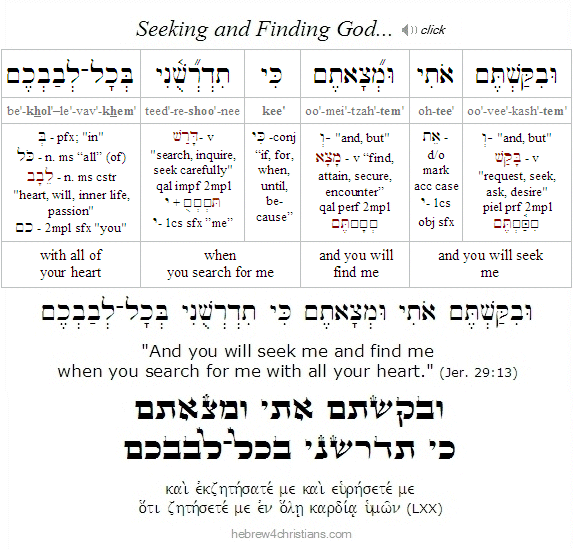 |
Kaddish and Providence...
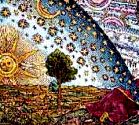
08.24.21 (Elul 16, 5781) Since we are required to affirm and to trust that "all things work together for good" (Rom. 8:28), we must bless God for perceived evil as well as for perceived good, since all circumstances of life come from the hand of the LORD our God. Despite appearances that sometimes seem to the contrary, we believe in an all-powerful, supreme LORD who has not abandoned the world, but who actively sustains and upholds it with benevolent intent. "We walk by faith and not by sight" (2 Cor. 5:7). When bad things happen to the righteous, we trust in God's personal care for their ultimate good, despite their present troubles (Psalm 34:19). As the prophet Job said: "Though he slay me, I will trust in Him" (Job 13:15). This is the heart behind the Kaddish, the mourner's prayer, that expresses acceptance of God's world, despite the pain, sorrow, loss, and so on.
The term hashgachah pratit (הַשְׁגָּחָה פְּרָטִית) refers to God's personal supervision of our lives (hashgachah means "supervision," and pratit means "individual" or "particular"). Since He is the Master of the Universe, God's supervision reaches to the smallest of details of creation - from subatomic particles to the great motions of the cosmos. God not only calls each star by its own name (Psalm 147:4), but knows each particular lily and sparrow (Matt. 6:28-30, 10:29). Each person created in the likeness of God is therefore under the direct, personal supervision of God Himself -- whether that soul is conscious of that fact or not. As Yeshua said, even the hairs on your head are all numbered (Matt. 10:30). Indeed, the God of Israel is called אלהֵי הָרוּחת לְכָל־בָּשָׂר / Elohei ha-ruchot lekhol-basar: "The God of the spirits of all flesh" (Num. 16:22), and that means He is LORD even over those who vainly attempt to suppress His Presence and reality. "Can a man hide himself in secret places so that I cannot see him? declares the LORD. Do I not fill heaven and earth?" (Jer. 23:24).
The Talmud says that when Moses asked God, "Please show me your glory" (Exod. 33:18), he was asking for God's vindication in the light of the gnawing question: "Why do the righteous suffer while the wicked prosper?" Moses was not given an explicit answer, and some of the sages said he wrote the enigmatic Book of Job to demonstrate that the question can only be reduced to God's inscrutable will: "Where were you when I laid the earth's foundation?" (Job 38:4). In other words, the question can only be answered by the One who knows the beginning from the end, the Infinite One who sees the implications and concatenation of all things. As finite beings, we see only a fraction of the big picture, and therefore we must yield our trust to the Wisdom and Power of Almighty God (Deut. 32:4).
It is written, "Your eyes saw me when I was inside the womb. All the days ordained for me were recorded in your scroll before one of them came into existence" (Psalm 139:16). In light of God's providential ordering of our lives, Blaise Pascal asked, "What is left for us but to unite our will to that of God himself, to will in him, with him, and for him the thing that he has eternally willed in us and for us." The Mishnah says it this way: "Do His will as if it was your will that He may do your will as if it was His will" (Avot 2:4). In other words, what else can we do but learn to trust, accept, and to say "yes" to life -- even if at times we may feel like orphans, lost in a fatherless world... All our days are recorded in God's scroll.
Therefore may God "teach us to number our days to get a heart of wisdom" (Psalm 90:12). The sages say on the day of death, one considers one's life as if it had been a single day... Life goes by so quickly, and we never know when our personal Rosh Hashanah will come. "No one knows the day or hour..." That's why it is so vital to be healed and to turn to God while there is still time. So turn to him today and bacharta ba'chayim (בָּחַרְתָּ בַּחַיִּים) - "choose life!" "For this commandment (of turning to God in teshuvah) is not hidden from you, and it is not far away. It is not in heaven... nor across the sea.... Rather, the matter is very near you - in your mouth and your heart - to do it" (Deut. 30:11-14; Rom. 10:8-13).
Hebrew Lesson:
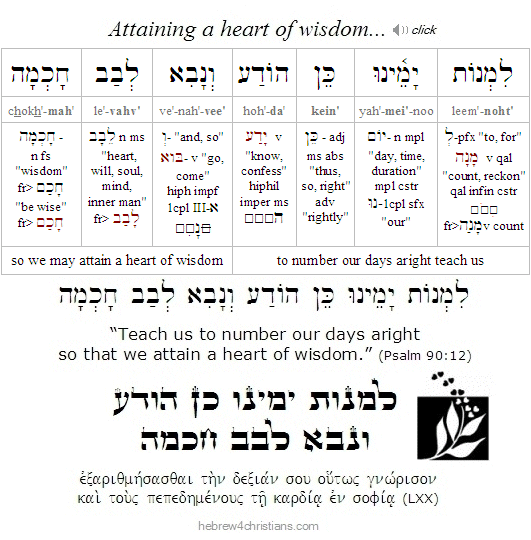 |
Seek God and Live...

[ The following concerns the "Season of Repentance" leading up to the High Holidays... ]
08.24.21 (Elul 16, 5781) The sages affirm, "This world is like a corridor before the World to Come; prepare yourself in the corridor, that you may enter into the hall" (Avot 4:21), which implies that the great commandment is always "seek Me and live" (Amos 5:4). "Seek the LORD while he may be found; call upon him while he is near" (Isa. 55:6). "Where can God be found?" asks the Kotzker rebbe, "but where one lets Him in..." God sometimes "hides" from us so that we are given the opportunity to seek Him with all our hearts.
כִּי כה אָמַר יְהוָה לְבֵית יִשְׂרָאֵל
דִּרְשׁוּנִי וִחְיוּ
kee' · khoh · ah·mar · Adonai · le·veit · yees·rah·el
deer'·shoo'·nee · vee·che·yoo

For thus says the LORD to the house of Israel:
"Seek me and live!"
(Amos 5:4)

Download Study Page
God's Spirit is always calling for us to return to Him, to "seek God and live..." What is holding your heart back? In Hebrew the word teshuvah (תְּשׁוּבָה) means an "answer" to a shelah (שְׁאֵלָה), or a question. It is a response to the call of God... The One who ransomed us from death and offers us life in abundance stands at the door knocking, waiting for us to respond to call (Rev. 3:20). During this Season of Teshuvah, may we hear the Voice of Him who invites the brokenhearted to join him: "Come to me, all who labor and are heavy laden, and I will give you rest" (Matt. 11:28). ברוך אתה יהוה המנחם - "Blessed are you LORD the Comforter."
Teshuvah of Love...

08.23.21 (Elul 15, 5781) When considering the matter of teshuvah (i.e., returning to God), it is vital to understand that God does not love you based on your obedience, though his love for you will lead you to obedience... It is only after accepting that you are accepted despite yourself -- despite your inherent inability to please God, despite your incurably sick heart, despite your disobedience, sin, and so on -- it is only then that earnest, Spirit-enabled obedience may spontaneously arise within your heart. In that sense "obedience" is like falling in love with someone. It is your love that moves you to act and to express your heart, and were you prevented from doing so, you would undoubtedly grieve over your loss... Therefore the "law of the Spirit of Life in Messiah" is first of all empowered by God's grace and love. We walk by faith, hope, and love - these three. And this explains why the very first step of teshuvah (repentance) is to love God: Shema! Ve'ahavta et Adonai... The first work of faith is to believe in the miracle that God's love is "for-you-love..."
"The Christian is in a different position from other people who are trying to be good. They hope, by being good, to please God if there is one; or -- if they think there is not -- at least they hope to deserve approval from good men. But the Christian thinks any good he does comes from the Christ-life inside him. He does not think God will love us because we are good, but that God will make us good because He loves us; just as the roof of a greenhouse does not attract the sun because it is bright, but becomes bright because the sun shines on it" (C.S. Lewis: Mere Christianity).
If you find yourself operating from a sense of God's conditional acceptance, you will undoubtedly need to repeat the same sins over and over until your heart is finally convinced of its incurably wretched state. You must first be utterly sick of yourself to believe in the miracle of God's deliverance. Only then will the message of find opportunity to speak...
It needs to be added, however, that genuine repentance implies an understanding that sin is dreadfully bad since it separates us from God's love. Some seem to think Yeshua died on the cross for their sins so that could live their lives without regard for sin, but that is of course a perversion of the truth. Yeshua did not suffer, bleed out, and agonize upon the cross for our sins so that we'd be given license to disregard the dreadful horror of sin and God's great cost to remedy our hearts... Indeed, by treating sin lightly we disparage the sacrificial work of Yeshua given on our behalf -- we "crucify the Son of God afresh" and thereby deny God's wrath for sin as well as his severe mercy given to those who trust in him (Heb. 6:4-9).
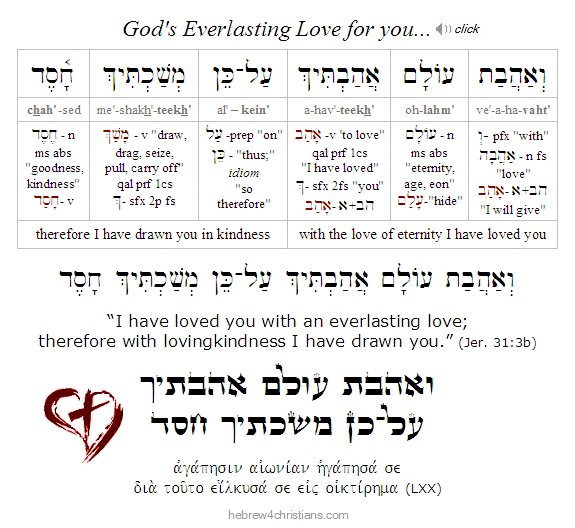 |
"Blessed is the man who walks not in the counsel of the wicked, nor stands in the way of sinners, nor sits in the seat of scoffers, but his delight is in the Torah of the LORD, and in His Torah he meditates day and night" (Psalm 1:1-2). Again, it is a severe mercy, a weighty grace, that is bestowed to us, friends...
Relentless Blessings...

08.23.21 (Elul 15, 5781) From our Torah portion for this week (Ki Tavo) we read: "And all these blessings shall come upon you and overtake you, if you hear (shema) the Voice of the LORD your God" (Deut. 28:2). The language here is unusual, as if these blessings would seize you like an army takes an enemy stronghold. The sages comment that God's blessings can "overtake" you in a way that may hide their true purpose for your good (Rom. 8:28). At such times we do not understand they are a concealed mercy (רַחֲמִים נִסְתָר) designed for our benefit. Therefore king David affirmed his confidence despite being surrounded by trouble. Where it is written, "Surely goodness and mercy shall follow me all the days of my life" (Psalm 23:6), the verb translated "shall follow me" (i.e., יִרְדְּפוּנִי) comes from a root word that means "to pursue," as a hunter chases after his prey. David was sure that God's lovingkindness would "hound" him as he made his way through this world - even in the dark places, even in "the valley of the shadow of death" (בְּגֵיא צַלְמָוֶת) - where God's rod and staff would there comfort him and shepherd his way (Psalm 23:4). Therefore we we pray: "May your love, O LORD, be upon us, even as we hope for You."
יְהִי־חַסְדְּךָ יְהוָה עָלֵינוּ
כַּאֲשֶׁר יִחַלְנוּ לָךְ
ye·hee-chas·de·kha · Adonai · ah·ley'·noo
ka·a·sher · yee·chal'·noo · lakh

"May your love, O LORD, be upon us,
even as we hope for You" (Psalm 33:22)

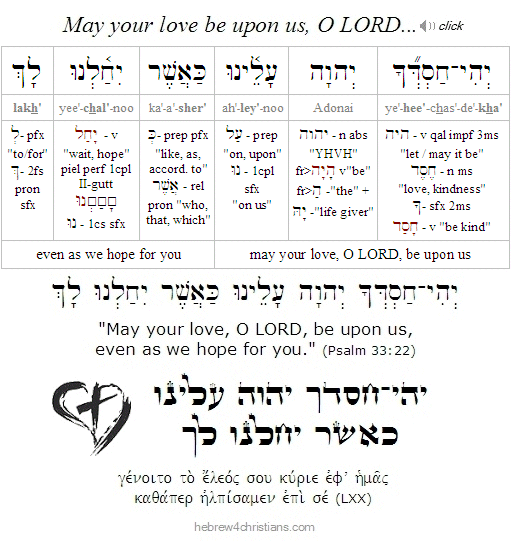 |
Whatever the heart seeks, it will find. We are constantly "asking, seeking, and knocking" (Matt. 7:7), even if we are often unaware of our heart's search. The one who pursues righteousness will find it, just as evil will come to the one who searches after it (Prov. 11:27). As it is written, "Those who worship worthless idols forsake the love (i.e., chesed: חֶסֶד) that could be theirs" (Jonah 2:8). David understood that as he pursued God, God's love would pursue him; as we seek, so we are sought by God; as we draw near to God, so He will draw near to us (James 4:8).
The prophet Hosea likewise cried out: "Let us know; let us press on to know (i.e., נִרְדְּפָה, "pursue after") the LORD; His going out is sure as the dawn; He will come to us as the showers, as the spring rains that water the earth" (Hos. 6:3). May God help us pursue him be'khol levavkha - with all our heart - because He has promised, "You will seek me and find me, when you seek me with all your heart" (Jer. 29:13). And may the love of the LORD indeed be upon us, even as we put our hope in Him. Amen.
 |
Shabbat Kumi Ori - קוּמִי אוֹרִי

[ The following entry concerns this week's Torah reading, parashat Ki Tavo... ]
08.22.21 (Elul 14, 5781) Shalom dear friends. The great holiday of Rosh Hashanah (i.e., "Yom Teruah") will begin in about two weeks (i.e., Monday, Sept. 6th at sundown). During the time leading up to the High Holidays, it is customary to engage in cheshbon ha-nefesh ("soul searching") and to derive comfort that God is forgiving and loving to those who sincerely turn to Him. Because of this, the Jewish sages chose seven "Haftarot of comfort" to encourage us to make our hearts ready for the upcoming High Holiday Season.
The haftarah for Ki Tavo (i.e., Isa. 60:1-22) is the sixth of the seven readings from the prophets that are consecutively read before Rosh Hashanah. These "haftarot of comfort" foretell of the restoration of the Jewish people and of the coming of the Messianic Era. In this week's reading, the haftarah portion describes the long-awaited future salvation of the nation of Israel. The LORD promises to shine His glorious light upon the Jewish people and to reveal His glory, despite the hour of darkness and tribulation that comes upon the earth:
"Arise and shine (קוּמִי אוֹרִי) for your light has come, and the glory of the LORD (כְּבוֹד יהוה) has risen upon you. For behold, darkness shall cover the earth, and thick darkness the peoples; but the LORD will shine upon you (וְעָלַיִךְ יִזְרַח יהוה), and his glory will be seen upon you (וּכְבוֹדוֹ עָלַיִךְ יֵרָאֶה). And nations shall come to your light, and kings to the brightness of your rising. Lift up your eyes all around, and see; they all gather together, they come to you; your sons shall come from afar, and your daughters shall be carried on the hip" (Isa. 60:1-4).
Sometime during the "plague of darkness" that represents the time of the Great Tribulation (i.e., the Day of the LORD and the judgment of the world, or Yom Adonai), Israel will finally turn to the LORD and receive Yeshua as their long-lost Messiah (Zech. 12:10). The veil will finally be taken away, and all Israel will be saved (Rom. 11:26; Isa. 59:20). The Light of Salvation (אור הישועה) will be revealed and the glory of the LORD (כְּבוֹד יהוה) will radiantly shine (זָרָח) upon the Jewish people. The land of Israel will be like Goshen during the times of the plagues of Egypt as the world powers are all judged and destroyed. Then the survivors of the nations will understand that the LORD is indeed with Israel and will turn to Him in surrender as well. "And the glory of the LORD shall be revealed, and all flesh shall see it together, for the mouth of the LORD has spoken" (Isa. 40:5). Yeshua will return to Zion to establish the Kingdom of God upon the earth (Zech. 2:10-13).
Hebrew Lesson:
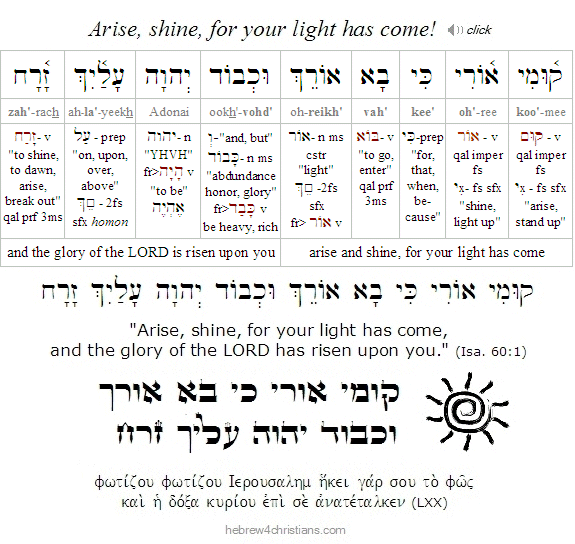 |
The LORD said to Moses from the midst of the shining flame: 'Take off your sandals from your feet, for the place on which you stand is holy' (Exod. 3:5). The Chofetz Chaim comments: We all need to rise higher... Never say, I will be able to lift myself up at another time or different place. By faith see that this place, right now, is holy ground, and awaits your response. May God open the "eyes of your heart" to help you see (Eph. 1:18-19).
Note: For more on this haftarah see: "The Coming Glory of Zion: Haftarah Ki Tavo."
Shavuah Tov Podcast:
Parashat Ki Tavo..
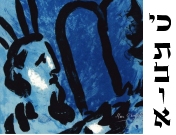
08.22.21 (Elul 14, 5781) In this week's "Shavuah Tov" audio podcast (see the links below) I discuss the the 40 day "Season of Teshuvah" leading up to the Jewish High Holidays as well as themes from weekly Torah portion, parashat Ki Tavo, which includes instructions for the people to ratify the Sinai covenant in the promised land by means of a special covenant renewal ceremony performed in the valley between Mount Ebal and Mount Gerazim. During this ceremony blessings for obedience and curses for disobedience would be declared, and Moses warned the people by providing a seemingly endless description of terrible consequences that would befall the Jewish people if they disobeyed the terms of the Sinai covenant (Deut. 28:15-68). I hope you will find it encouraging.
Parashat Ki Tavo - כי־תבוא

08.22.21 (Elul 14, 5781) Shavuah tov, chaverim! Our Torah portion this week (Ki Tavo) includes instructions for the people to ratify the Sinai covenant in the promised land by means of a special ceremony performed in the valley between Mount Ebal and Mount Gerazim (later fulfilled by Israel, see Josh. 8:30-35). During this ceremony the blessings for obedience and the curses for disobedience would be declared, and Moses warned the people by providing a seemingly endless description of terrible consequences that would befall the Jewish people if they disobeyed the terms of the Sinai covenant (Deut. 28:15-68). In Jewish tradition this litany of woe is called the "tochachah" (תּוֹכָחָה), a word that means "rebuke" or "reprimand."
Reading the tochachah is difficult and painful, though it serves as a bitter medicine to wake us up and prevent us from falling into a lethal coma. In that sense the tochechah may be regarded as a great blessing, since it shocks us into experiencing the gravity of God's grace. This is similar to Yeshua's grave warnings about the dangers of hell. If we refuse to listen or rush past his words, we are missing the substance of God's lament given through the Hebrew prophets. Sin is a lethal problem, and we must turn to God for healing or we will die. As Blaise Pascal once wrote, "Between heaven and hell is only this life, which is the most fragile thing in the world." Therefore shuvah! -- turn to God and receive the blessing of life!
Hebrew Lesson:
Healing from hidden faults...

08.20.21 (Elul 12, 5781) All of us have unhealed parts, "hidden faults" (נסתרות) of which we are not fully aware. "Blind spots." Therefore king David prayed, "Who can discern his errors? cleanse me from secret faults" (Psalm 19:12). We are cleansed by confession, that is, by looking within our hearts to uncover deeper motivations... If we are honest with ourselves we may discover, for example, that we are angry or fearful people, despite how we otherwise wish to regard ourselves. If you find yourself unable to let something go, for instance, some pain or failure of the past, remind yourself that you must do so if you want to move on with your life. Focusing on how things could have been different is to be enslaved to the past. The goal of teshuvah (repentance) is to turn us back to God for life, but to do this, we must be be willing to let go of what makes us sick.
Note that the Hebrew word translated "errors" (i.e., שְׁגִיאוֹת) comes from a root word (שָׁגָה) that means to wander, stray, or transgress. The question raised by David is rhetorical: "Who can discern his errors?" No one – apart from divine intervention... David asked to be cleansed from his "secret faults," which are not those that were performed by him "in secret," but rather those that were unknown, unseen, and unconscious to his own sense of awareness. These are "mindless" sins, unthinking offenses, hidden dispositions, character defects and actions that a person unwittingly performs, perhaps because of deep forces of which he was oblivious. These are the "secret sins" set in the light of God's face (Psalm 90:8); the "sluggish darkness" of the human heart that leads to death and ruin: "The heart is deceitful above all things, and incurably sick; who can understand it?" (Jer. 17:9). How many of us, after all, are fully aware of what we are doing when we are doing something? How many of us are completely transparent both to ourselves and before God, with no unclear motives, etc.? We must always be vigilant... There is always the force of habit, or the subconscious desires or conflicts of the inner life, that work on us, not to mention the trauma of our past and the present devices from the enemy of our souls. May the LORD give us the willingness to be healed, even if there are parts of ourselves that seem to resist that healing. Amen.
Hebrew Lesson:
Great is His Faithfulness...

08.20.21 (Elul 12, 5781) Heaven and earth touch in innumerable ways. Every day we are given opportunity to turn to God and find life. The sages have said that the sun is red in the morning because it passes by the roses of the garden of Eden, and at sunset because it passes by the gate of Hell (Bava Batra 84a). The tender mercies of the Lord are renewed every morning, and for that reason we should turn to God when we first open our eyes to the light of the new day and say: Modeh ani lefanekha, Adonai (מודה אני לפניך יהוה), "thank you, O Lord, for another opportunity to reach out to you for life." Amen.
Fighting Spiritual Blindness...

[ The following entry concerns this week's Torah reading, parashat Ki Teitzei.... ]
08.20.21 (Elul 12, 5781) Our Torah portion this week (Ki Teitzei) commands us to remember what the Amalekites did to the Jewish people just after they left Egypt during the time of the Exodus (Exod. 17:8-16; Deut. 25:17-19). Paradoxically God commanded the Israelites to "blot out the remembrance" of Amalek while swearing to fight Amalek "from generation to generation" (Deut. 17:16). In this connection note that the name "Amalek" (עֲמָלֵק) begins with the letter Ayin (symbolizing the eye) and equals 240 in gematria -- the same value for safek (סָפֵק), the Hebrew word for doubt. Amalek therefore symbolizes "the eye of doubt," or even "the severed eye" (the Hebrew verb מָלָק means "to chop" or "sever" in reference to the "eye" of Ayin). The power of Amalek therefore represents spiritual blindness as it acts in the world. We are never to forget that the light of God overcomes the darkness of this world, and that light is found in Yeshua our LORD....
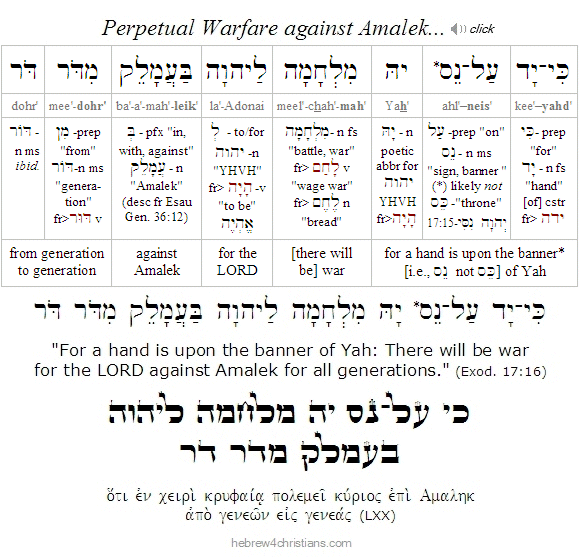 |
Note: For more on this important topic, see "Warfare with Amalek."
Torah of Adversity...

08.20.21 (Elul 12, 5781) How we choose to deal with trouble and suffering (i.e., tzuris) makes all the difference. We may be tempted to bitterness over our lives, but then what? To paraphrase Soren Kierkegaard, the way of life is "how" more than it is "what." You may be powerless to control reality, but you are nevertheless responsible for how you respond to it. Check your attitude. Do you chose to live in lament over a healing that has not yet happened, or perhaps regard yourself as a hapless victim? Or will you attempt to justify your suffering as a means of personal atonement, accepting it passively as a "good child" or martyr? Does your suffering stretch your heart, or does it cause you to shrink back in fear or self-pity?
In this connection, recall that when the Jews came to Marah, they "could not drink the water because it was bitter" (Exod. 15:23). The Hebrew, however, could be read, "they could not drink the water because they (i.e., the people) were bitter (כִּי מָרִים הֵם). The problem is often not "out there" but within the heart (Matt. 15:19-20). How we choose to see, in other words, says more about us than it does the external world. If you make the mistake of reading the daily news and taking it seriously, you will see only ugliness, and you run the risk of becoming hardhearted. Worldly despair eclipses apprehension of the Presence of God....
We have to use ayin tovah, "a good eye," whenever we encounter the inevitable (and ubiquitous) adversities of life. Instead of seeing ourselves as victims of undeserved trouble, and instead of harboring resentment over the past and entertaining fear of the future, we must learn to see adversity in the light of faith that teaches lessons about finding endurance, resilience and hope. Faith affirms that adversity has an end that is ultimately good. Faith will not bow the knee to dark visions and live in dread of worldly fate.
It's been said, "hurt people hurt people," which means that if healing is not found for our woundedness, our pain will likely "leak out" as depression and hostility toward others... Finding inner peace is therefore crucial lest we become poisoned through a "root of bitterness" that defiles many (Heb. 12:15). The worst sort of prison is the one we make for ourselves, by choosing to be taken captive by fear and anger. May the Lord show us mercy and help us grow in grace and in the knowledge of his heart in all things. Amen.
Hebrew Lesson:
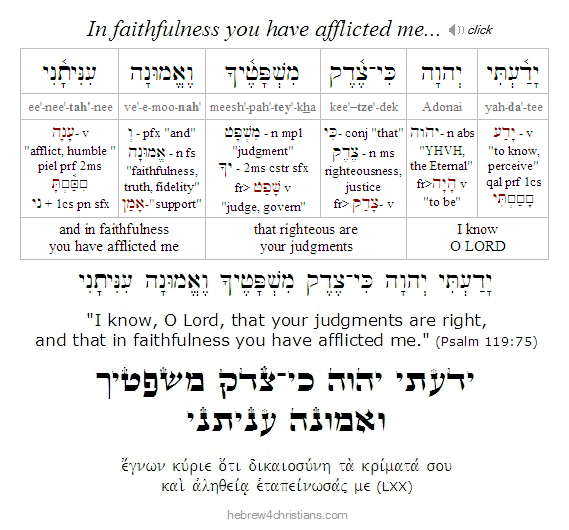 |
Philosophy of Torah...
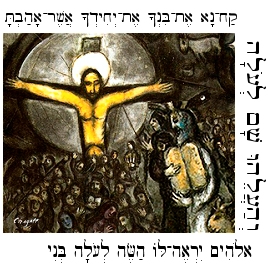
08.19.21 (Elul 11, 5781) The Torah of Moses teaches that a defect-free male lamb must be sacrificed and roasted at the appointed time every year, eaten with matzah and bitter herbs, as a memorial of the redemption from Egypt (Num. 9:2, Deut. 16:1-8) -- yet today, after the ministry and sacrificial death of Yeshua as the Lamb of God, we no longer perform the sacrificial rite of the Passover given to the Levites on behalf of Israel. We do not offer a lamb for sacrifice not because there is no Temple to offer such sacrifices, but because we have a greater priesthood based on the sworn oath of God that predates the Levitical priesthood in the life of the Messiah (Psalm 110:4). This is explained in the Book of Hebrews, chapter seven, which explains that "if perfection had been attainable through the Levitical priesthood (for under it the people received the law), what further need would there have been for another priest to arise after the order of Melchizedek, rather than one named after the order of Aaron? But when there is a change in the priesthood, there is necessarily a change in the law as well" (Heb. 7:11-12). The bottom line is that the promised new covenant (בּרית חדשׁה) of God centers on the sacrificial ministry of Yeshua as our Great High Priest, and this covenant provides a new way - "not according to the covenant made with the fathers at Sinai after the Exodus" - to be in right relationship with God (Jer. 31:31-34; Heb. 8:1-13). "And when Messiah had offered for all time a single sacrifice for sins, he sat down at the right hand of God, waiting from that time until his enemies should be made a footstool for his feet. For by one offering He has perfected forever those being sanctified" (Heb. 10:14).
So it is clear - if you believe the message of the gospel - that God has abolished the role of animal sacrifice in the law of Moses through the death of his Son as our eternal atonement (Heb. 9:12-15). "Because the law (of sacrifice) made nothing perfect, a better hope is introduced, and that is how we draw near to God" (Heb. 7:19). The veil of separation has been torn in the body of our Lord (Matt. 27:51; Mark 15:38; Heb. 10:12); and through the intercession and mediation of Yeshua, we now have direct access to the Presence of God by faith (Heb. 4:16). The great prophesy of Caiaphas has been fulfilled: "it is better for you that one man should die for the people, not that the whole nation should perish" (John 11:49-50). Yeshua himself is the atoning sacrifice for our sins, and not for ours only but for the whole world" (1 John 2:1-2; Rom. 3:25). As the very Lawgiver of Reality, the LORD has the power and authority to introduce a "new covenant," and indeed were it not for that great blessing we would have no means of eternal redemption under the law. Yeshua "takes away the first covenant that he might establish the second" (see Heb. 10:4-18).
But what about other aspects of the law of Moses besides the sacrifices? To begin answering that question, we must distinguish between the idea of "law" and the idea of "covenant." The law, or Torah, of the LORD means something more than the words of the covenant given at Sinai. Torah is rightly understood as a general term denoting God's direction or teaching about how to be in right relationship with him (mitzvot, mishpatim, chukkim, etc. are specific applications of Torah itself). That is the Apostle Paul's point in the book of Galatians where he points to Abraham as one who kept God's Torah 400 years before the time of Sinai. Abraham obeyed God's Torah before the time of giving of the covenant at Sinai! That said, there is a relationship between a divine "covenant" (or "agreement") and the law, though the idea of covenant is more basic, and Torah is understood as our response to the underlying covenant. Torah, then, is a "function word" of covenant, expressing our obligations - ritual, moral, spiritual, etc., - in relation to that covenant. Where this may get confusing is that while both Moses' teaching is Torah, and Yeshua's teaching is Torah, and while there is overlap and continuity in moral and spiritual application, the Sinai covenant and the covenant of the Cross at Zion are mutually exclusive ways to attain atonement before God, and that is why followers of Yeshua do not offer animal sacrifices for their sins, etc., even though the sacrificial system itself assuredly bore witness to the coming of the great Lamb of God (Rom. 3:21; Num. 28:3). The same point can be made regarding other aspects of the teachings of Moses such as various religious and civil laws, laws of warfare and capital punishment, laws regarding "clean and unclean" (ritual purity), dietary law, and so on. The "weightier" matters of the law given at Sinai are preserved and incorporated into the new covenant, as the law provided a "pattern" or "analogy" of what was to come (Heb. 10:1), yet the ritual laws of sacrifice are now abolished by the new and better covenant of the Messiah (see Heb. 8:6).
So you see that followers of Messiah must be philosophers of sorts, that is, those who think deeply about the underlying meaning and purpose of God as revealed in the Scriptures. After all, Yeshua often taught in parables and used metaphors in his teaching (Matt. 13:35; John 6:35, 8:12, 10:9-11, etc.). When he said that he was "the door," he didn't expect us to look for a door knob on him (John 10:7-9)! When he warned his followers about the "leaven" of the religious leaders, he chided his disciples for thinking about material bread (Matt. 16:5-12). Indeed Yeshua was often exasperated with his followers for missing the point (Matt. 15:6; Luke 24:25-26). He regularly spoke of the "mysteries of the kingdom of God" (Luke 8:10; Mark 4:11). He taught his followers how to see the meaning of the redemption, of true healing, and of God's kingdom. "The wisdom of God is given in a mystery, even the hidden wisdom, which God ordained before the world for our glory" (1 Cor. 2:7; Rom. 16:25-26). We must learn to reason analogically and rightly divide (ὀρθοτομέω, i.e., "cut straight") the word of truth (2 Tim. 2:15). "We impart this in words not taught by human wisdom but taught by the Spirit, interpreting spiritual truths to those who are spiritual" (1 Cor. 2:13). We discern the "weightier" matters of the Torah to center on God's love for his people and his salvation given in Yeshua our Messiah. He is the Light of the world, the Bread of life, and our Good Shepherd. Amen: He is the way and the truth and the life of God given for us!
Restoring what is Lost...

08.19.21 (Elul 11, 5781) In our Torah reading for this week, parashat Ki Teitzei, we read: "Do not ignore the loss of your brother... you shall restore it to him" (Deut. 22:1-3). This indicates that we have a moral duty to return lost items to others, and on a spiritual level that includes restoring honor and dignity to those who have lost sight of their value in the eyes of God... For even greater reason we must make restitution to those whom we have harmed. Making amends is part of the teshuvah process. We hurt ourselves when we hurt others, and we hurt others when we hurt ourselves. The way out of that circle is through making amends. As Yeshua taught: "If you are offering your gift at the altar and there remember that your brother has something against you, leave your gift there before the altar and go. First be reconciled to your brother, and then come and offer your gift" (Matt. 5:22-23). "Therefore, confess your sins to one another and pray for one another, that you may be healed. The prayer of a righteous person works great power" (James 5:16). Ultimately, confession of the truth is not optional for anyone.
Indeed, regarding the duty to restore what is lost to our brother mentioned above, the Torah adds, "and you are not to ignore it," which literally reads, "you are unable to hide it" (לא תוּכַל לְהִתְעַלֵּם). Rabbi Abraham Twerski notes that the Torah is not giving us a command as much as stating a fact: You are unable to hide from a wrongful act. In other words, the problem with "getting away with it" is that you get away with it, that is, you take it with you. Such self-deception sears your conscience, makes you numb inside, and deadens the heart. Making amends to others is life-giving, helping you let go of what you've done wrong to restore inner peace. We must be vigilant not to let our hearts die because of either shame or rationalization. May the LORD help us walk in the Spirit of Truth.
 |
Shavuah Tov Podcast:
Why then the Law?
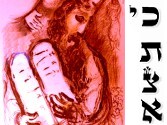
08.19.21 (Elul 11, 5781) Our Torah reading for this week (i.e., Ki Teitzei) identifies 74 of the Torah's 613 commandments (more than any other), which again raises the question of whether we are obligated to follow the lawcode of Moses or not... In this Shavuah Tov broadcast, I explore how we are to understand the law in light of the salvation given in Yeshua the Messiah. I hope you will find it both provocative and helpful.
The Law of Faith...
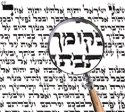
[ The following entry concerns this week's Torah reading, parashat Ki Teitzei, which contains more commandments than any other Torah portion... ]
08.19.21 (Elul 11, 5781) When asked how many commandments are in the Torah, most Jews will answer 613, based on Jewish tradition (the number 613 is sometimes called "taryag" (תריג), an abbreviation for the letters Tav (400) + Resh (200) + Yod (10) + Gimmel (3) = 613). Despite several attempts made over the centuries, however, there has never been a definitive list of these commandments, and of those who tried to compile such, no two agree... Some say the number 613 comes from a fanciful midrash that teaches that since there are 365 days in a year (corresponding to the 365 negative commandments) and 248 "parts" of the body (corresponding to the positive commandments), each day we should use our body to serve God. Regardless of the exact count, however, the Talmud followed the Apostle Paul by understanding all the Torah's commandments to be derived from the Ten Commandments given at Sinai, the most basic of which is the very First Commandment, namely, "I AM the LORD your God (אָנכִי יְהוָה אֱלהֶיךָ) who brought you out of Egypt, out of the house of slavery" (Exod. 20:2). This foundational commandment was later restated by the prophet Habbakuk simply as: וְצַדִּיק בֶּאֱמוּנָתוֹ יִחְיֶה / "The righteous person will live by faith in God" (Hab. 2:4; Gal. 3:11; Heb. 10:38). Indeed, Yeshua taught us the law of faith in God's love, which preempts, overrules, and informs all the others...
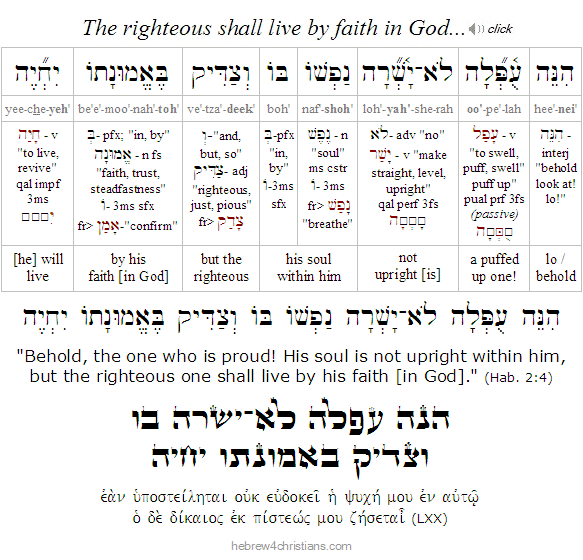 |
Teshuvah of the Heart...

08.19.21 (Elul 11, 5781) Part of the meaning of teshuvah (i.e., "repentance"), at least for some of us, is learning to trust and believe in love.... If you were abandoned as a child, for instance, you were deprived of the security, nurture, and basic human connection you needed to partake in love. Instead of acquiring a sense of belonging and acceptance your soul desperately needed, you inherited a sense of shame that taught that you were inherently unlovable and unworthy. Consequently, as you grew up, you may have found it difficult to trust or ask others for help; you might have turned inward, relying only on yourself, protecting yourself from further pain. You may have became lonely, filled with sadness, anger, and fear. Ironically and tragically, as you protected yourself from abandonment you made your heart hard and numb, and that led to the abandonment of yourself....
There are providential miracles... Healing can come when we turn again to ourselves - unconditionally accepting ourselves despite the pain of our past - and open our hearts to be loved. It was when he "came to himself" that the prodigal made the decision to go back to his father (Luke 15:17). Therefore the Spirit of God calls out to the bereft: "Return to your heart and know" (Deut. 4:29). This is possible only if we are willing to turn to God for the grace we need to be made whole. It is by turning to God (i.e., teshuvah) that we find ourselves to be beloved and made whole. Believing in God's love for us enables us to truly love ourselves, and from that connection, we can move out to love others as well.
O friend of forsaken hope, savor the phrase, "Know therefore today and return to your heart..." It the heart that is the place of connection with God... As Yeshua said, "Behold, I stand at the door and knock. If anyone hears my voice and opens the door, I will come in to him and eat with him, and he with me" (Rev. 3:20). Today may you find courage to "return to your heart" and receive again God's love for your soul... Amen.
Hebrew Lesson:
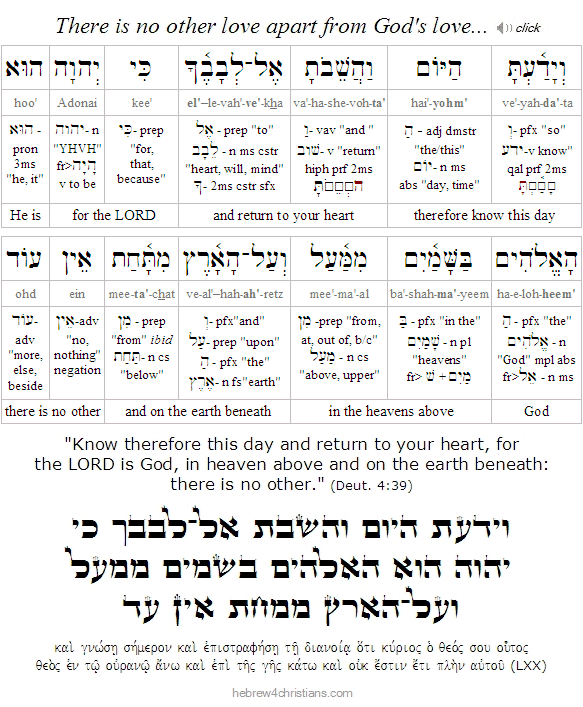 |
Season of Teshuvah...

[ The following is related to the month of Elul and the theme of teshuvah (repentance)... ]
08.18.21 (Elul 10, 5781) The Apostle Paul said we were to both "test ourselves" with regard to the intellectual content of our faith and also to "prove ourselves" with regard to the veracity of our spiritual life: "Put yourselves to the test (ἑαυτοὺς πειράζετε) to see if you are in the faith; prove yourselves (ἑαυτοὺς δοκιμάζετε) to see whether Yeshua the Messiah lives within you - lest you fail the test and be disapproved (ἀδόκιμος)" (1 Cor. 13:5). Notice that the verb "to prove" (i.e., dokimadzo: δοκιμάζω) means to test something by fire (like a precious metal) to discover its quality and purity. The analogy here is straightforward. The quality of our faith will be revealed during times of testing and hard circumstance. Do we walk in love, joy, and peace - despite the testing of this life? If our faith regularly fails in the crucible of testing, we may need to reexamine its authenticity (Prov. 24:10).
Hebrew Lesson:
Click the table below for the Hebrew audio:
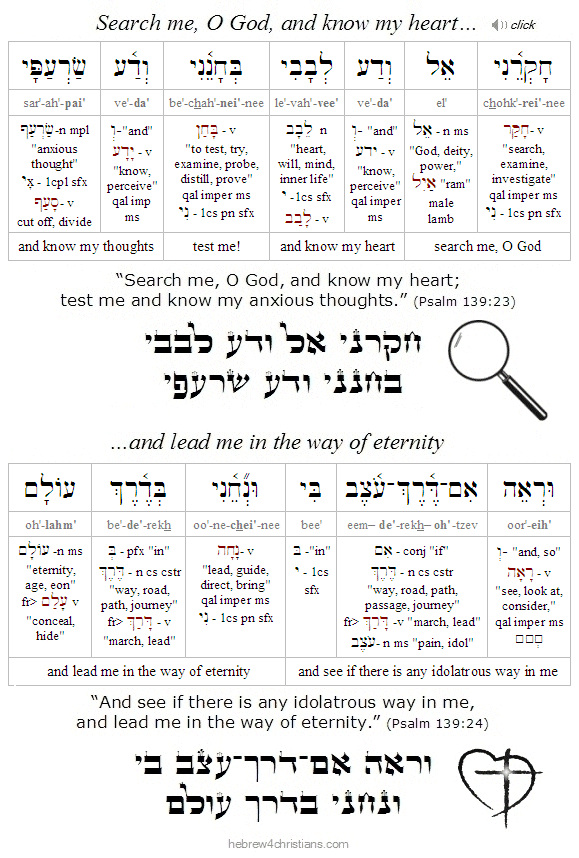 |
A proven faith is one that evidences the Fruit of the Holy Spirit, though other characteristics include an abhorrence for personal sin and the desire to obtain God's forgiveness; a hunger and thirst for God's righteousness to be manifest; a sincere willingness to obey the LORD and keep His commandments, and a heartfelt love for God and others. These characteristics mark genuine teshuvah ("repentance"), that is, a turning away from inner darkness to the light of the Divine Presence. Teshuvah is a miracle that transforms the person so that the inner life is restructured and made into a new creation by means of God's grace (2 Cor. 5:17). Spiritual rebirth implies a new heart with a new set of affections: "I am crucified with Messiah; it is no longer I who live, but Messiah who lives in me. And the life I now live in the flesh I live by faith in the Son of God, who loved me and gave himself for me" (Gal. 2:20).
The Jewish view of truth is inherently existential - how you live reveals what you believe, and vice-versa. The truth must be lived in order to be real. We are to be "doers" of the Word, and not hearers only, since faith without works is dead and leads to self-deception (lit., "reasoning around" the truth, i.e., παραλογίζομαι, from παρά, "around, beside" and λογίζομαι, "to reason"). Only those who follow through and live out their faith will be blessed in their actions (James 1:22, 25). This mirrors Yeshua's statement, "If you know these things, blessed are you if you do them" (John 13:17).
Reb Lev said, 'A tzaddik is one who lives Torah, not one who preaches it. Your actions, not your words! You have to be Torah: your habits, your motions, even your silences - are what count..."
There remains the frightening possibility that the soul - even the soul that professes faith in the Messiah - may fail the test of genuine faith and be rejected (i.e., adokimos: ἀδόκιμος, "tested and found useless"). A person who merely professes love for God with his lips but whose heart is far from Him will eventually hear the verdict of truth, which ratifies the inner life of the soul: "Depart from Me, I never knew you..." This is the like-for-like principle of faith, the reciprocity of the inner life of the soul. Our faith in Messiah must be unalloyed - pure, without compromise in its composition and character. May God help each of us...
Should we live in fear of ourselves? After all, "the heart is deceptive above all things and desperately wicked" (Jer. 17:9), and it is woefully easy to fool ourselves regarding our sins (1 Cor. 8:2; Gal. 6:3; James 1:26). Well on the one hand we should indeed be afraid of our own sinful tendencies and abhor the sin in our lives, but on the other we must practice hope in God and trust in his healing and deliverance. Moreover, we can experience freedom from dread by receiving the joy that comes from the assurance that we are accepted in the Beloved. God has not given us a spirit of slavery to fall back into fear; and there is no fear in His love (Rom. 8:15; 2 Tim. 1:7; 1 John 4:18). Of course we all will fail the test apart from the grace and love of God, and no one can be approved by means of the unaided will. We all need a miracle from God to love Him in the truth and to pass the test -- but God is the One who performs miracles for us. The LORD is Adonai Nissi (יהוה נִסִּי), the God of my miracle...
There is a price to be paid for the miracle of God being manifest in our lives. The message of the cross means confessing the truth about who we are and how we have failed the test of faith. Yeshua does not appeal to the self-righteous ones to come for healing, but rather to the sin-sick and weary (Mark 2:17). The LORD wants us to be honest with ourselves, as it says: ""Behold, You delight in truth in the inward being, and you teach me wisdom in the secret heart" (Psalm 51:6).
The Tenth Commandment says, "do not covet" anything that belongs to your neighbor (Deut. 5:21), though the Hebrew does not simply say "do not desire" (i.e., לא תְאַוֶּה) but rather "do not bring yourself into a state of desire" (i.e., לא תִתְאַוֶּה), the verb in this case (אָוַה) being "hitpael" (reflexive), that is, expressing the relationship within yourself to the truth of God. As Soren Kierkegaard once said, the "self" expresses a relation with itself, and the "how" of that relation determines what sort of self we are... God does not command us like someone might train a dog; he instructs us to awaken to what we are doing, to take responsibility for our lives, and not to yield our hearts to envy, despair, and sorrow.
The unexamined life -- especially as a follower of Yeshua -- is not worth living, and the practice of suppressing the truth about our sinful condition can lead to self-deception and even death (1 Cor. 11:30). "If we say we have no sin, we deceive ourselves, and the truth is not in us; if we confess our sins, he is faithful and just to forgive us our sins and to cleanse us from all unrighteousness" (1 John 1:7-8). "Therefore, confess (ἐξομολογέω, lit. 'confess out') your sins to one another and pray (εὔχομαι) for one another, that you may be healed. The prayer of a righteous person (tzaddik) works great power" (James 5:16).
 |
Do you now believe?

08.17.21 (Elul 9, 5781) "Do you now believe?" (John 16:31). Some people are scandalized by what they call "easy believism," or the idea that we only need to believe in Yeshua to be saved. Sometimes they malign this teaching as "cheap grace" or "sloppy agape," though in fairness it must be stressed there is nothing easy about truly believing. What is easy, however, is professing that you believe without undergoing a miraculous heart transformation. Anyone can say, "I believe in Jesus," but the test is whether he lives within you. Is he the source of your life? Do you draw life from Him? Anyone can claim they are saved, but it is a miracle greater than splitting the sea to undergo divine metamorphosis, to be given a heart that loves unconditionally, that dies to pride, and that lives as the servant of all. Yeshua asks, "Do you really believe? Many will say to me in that day, 'Lord, Lord...' but I will say to them, 'I never knew you...' (Matt. 7:22-23). It's not just hard to believe (obey), it's impossible apart from God's radical intervention. It is the Spirit that gives life; the flesh is no help at all (John 6:33).
Living by faith does not mean we profess Christianity or "talk theology" like some college professor. It's one thing to believe that, and another to believe in... Human reason can rightly infer that a morally good, all-powerful Creator exists, for example (Rom. 1:20), but it is unable to know God's love that way... Love requires trust, "taking to the heart." We are to "know this day and turn to your heart (והֲשֵׁבתָ אֶל־לְבָבֶךָ) that the LORD is God in heaven above and on the earth beneath; there is no other" (Deut. 4:39). We need to know truth (cognitive) and to be moved by the heart (emotional); we need both Spirit and Truth (John 4:24). "For all things come from You (כִּי־מִמְּךָ הַכּל), and from your hand we give to you" (1 Chron. 29:14). Teshuvah centers on Yeshua our Savior: turn to believe in Him!
Regarding the question of faith, Kierkegaard once wrote, "The easiness of Christianity is distinguished by one thing only: by the difficulty. Thus the Master's yoke it easy and its burden light -- for the person who has cast off all his burdens, all of them, the burdens of hope and of fear and of despondency and of despair -- yet it is difficult." Yes, the difficult thing is to truly believe in the "for-you miracle" of God's love. Sins can be like great possessions that are difficult to give up. Among other things, we must forgive ("give away") our sins (both our own and those against us), and that means trusting God enough to bear our wounds for us. Forgiveness allows us to move on with our lives by letting go of the pain of the past (2 Cor. 5:16). The atonement cost God everything, and yet is of no spiritual value until it is accepted into the heart. It is "easy" to understand this, but it is difficult to live it.
Hebrew Lesson:
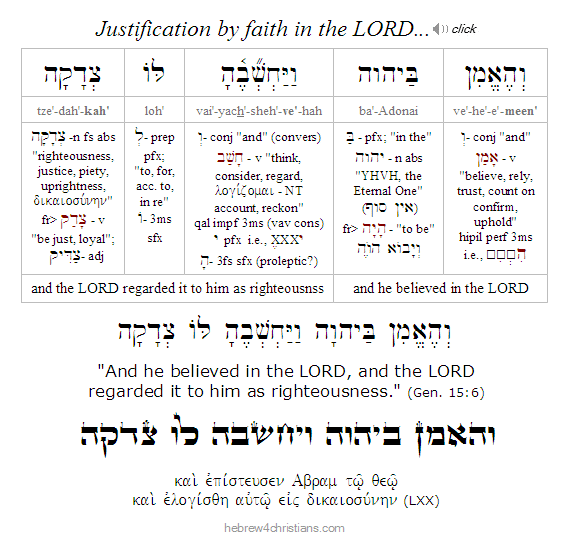 |
Days of Difficulty...
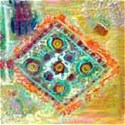
08.17.21 (Elul 9, 5781) I am having a rough day today, chaverim. I made the mistake of getting caught up in the "drama" presented by worldly news for awhile and then listened to various social commentators discuss the encroaching rise of tyranny we are seeing... We are living in fateful days, friends, wherein everything we once took for granted hangs in the balance.. It is hard not to be grieved, appalled, angry, and discouraged when we consider what is going on in the sin-sick world today; it is a challenge not to feel powerless in the midst of the seemingly unstoppable cultural slide into insanity and self-destruction.
"And we are here as on a darkling plain
Swept with confused alarms of struggle and flight,
Where ignorant armies clash by night." (Arnold)
Nevertheless, even if days of great tribulation begin their approach, we shall not give way to dread. "For such a time as this," friends.... We need to pray and seek God's face; we need to boldly turn to the Lord and ask for His direct intervention and help; we need power from on high to equip us to walk in righteousness and courage during these evil days. Let us therefore be strong and let our hearts be strengthened, for He is faithful and true. The LORD our God is with us; He will never leave nor forsake those who put their trust in Him. Amen.
The Way Back Home...
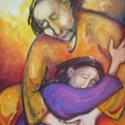
08.17.21 (Elul 9, 5781) "If we confess our sins..." (1 John 1:9). The question is raised, if a man sins purposely, how can he know whether his intentional repentance can overcome his intentional sin? We must press on, and maintain our teshuvah. Even if we sin 70 x 7 times (Matt. 18:21-22), we are forbidden to regard ourselves as beyond the reach of God's healing love. Our Savior cries out: "Come to me all who are heavy laden, and I will give you rest."
A king's son was at a far distance from his father. Said his friends to him, "Return to your father." He said, "I can't: the way is too far. His father sent to him and said, "Go as far as you are able, and I will come the rest of the way to you. Thus says the Holy One, blessed be He: "Return to me, and I will return to you, says the LORD of hosts" (Mal. 3:7).
Hebrew Lesson:
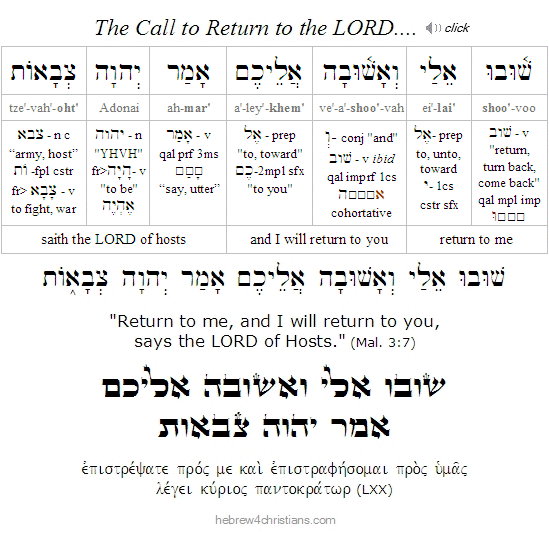 |
"Know therefore today and return to your heart (והשׁבת אל־לבבך), for the LORD is God in heaven above and on the earth beneath; there is no other" (Deut. 4:39). Here again we see the centrality of the heart as the mode to encounter God (Luke 17:21).
It is never too late to turn to God... there is always hope. The prophet Jeremiah spoke in the Name of the LORD: "Return, faithless Israel, declares the LORD. I will not look on you in anger, for I am kind (כִּי־חָסִיד אֲנִי), declares the LORD" (Jer. 3:12). When the people drew back in shame, however, God encouraged them by saying "My children, if you return, will you not be returning to your Father? Return, O faithless sons; I will heal your faithlessness." The penitent replied: "Behold, we come to you, for you are the LORD our God" (Jer. 3:22).
Established in God's Way...

08.16.21 (Elul 8, 5781) When you come to know the truth that the LORD is your Rock, the very ground upon which you live, move, and have your being, then are your steps are made sure, as it says, "The steps of a man are established by the LORD, when he delights in his way; though he fall, he shall not be cast down: for the LORD holds his hand" (Psalm 37:23-24). When you are unsure of your way, however, and walk in uncertainty, you are unsteady in your resolve and are tempted to regard your life as being without any solid foundation. As you commit your way to the LORD, your steps are made sure, for you are walking before his Presence, and therefore you are upheld by his power.
Assured by Love's Promise...

08.16.21 (Elul 8, 5781) Right now, if you are seeing this, affirm that the Lord Yeshua is your deliverer and that you trust in Him for eternal life. As he promised: "I tell you the solemn truth, the one who hears my message and believes in the One who sent me has (i.e., present active indicative) eternal life and will not be condemned, but has passed over (literally, "crossed over") from death to life" (John 5:24). Note that the verb translated "has passed over" is "perfect active" that expresses completed action: "this one has already crossed over from death to life." In other words, the gift of eternal life is an accomplished reality (though it is only experienced as we truly surrender to the love and grace of God from a heart of faith). The "basis" of life is now radically new and of a different order. As the apostle Paul later summarized: "For it is by grace you have been saved (i.e., a perfect passive participle that denotes completed action done on your behalf with effects that continue to the present) through faith, and this is not from yourselves, it is the gift of God, not a result of works, so that no one may boast" (Eph. 2:9-10). I'm so glad it's not the strength of my grip that keeps me holding on to God, but the strength of His...
So "be strong and of good courage" – chazak ve'ematz! The Lord our God promises "never to leave you nor forsake you" and to be with you wherever you go (see Josh. 1:5,9; Heb. 13:5, Psalm 139; Matt. 28:20). In the Greek New Testament, the wording of Hebrews 13:5 is highly emphatic: Οὐ μή σε ἀνῶ, οὐδ᾽ οὐ μή σε ἐγκαταλείπω: "Not ever will I give up on you; no, not ever will I leave you behind." May you hear the voice of the Good Shepherd calling you, and may He forever keep you under His watchful care. Amen.
Hebrew Lesson:
The Everlasting Way...

08.15.21 (Elul 7, 5781) The sages say that teshuvah (return) was created before the world itself, as it says, "Before the mountains were born, or you brought the world into being, you were the Eternal God who says: "Return (שׁוּבוּ), O children of man" (Psalm 90:2-3). There is a deeper blessing that preceded our exile... The Lamb of God was slain from the foundation of the world, and God clothed humanity in divine sacrifice from the very beginning (Gen. 3:15,21; Rev. 13:8). The water of life (מַיִם חַיִּים) flows from the original orchard of Eden to the world to come (Gen. 2:10; Rev. 22:1). The LORD subjected creation to vanity for the sake of hope (Rom. 8:20), for the revelation of his greatness, as he descended into its depths to return and restore all things to himself. God decreed to enter space-time as the Son of Man, the "Second Adam," to become our Savior and healer. He came to reveal the face of God to us (2 Cor. 4:6). Yeshua "descended in order to ascend" so that would could know God's compassion, love and healing through his mesirat nefesh – his total sacrifice of body and soul – to return us to God.
Hebrew Lesson:
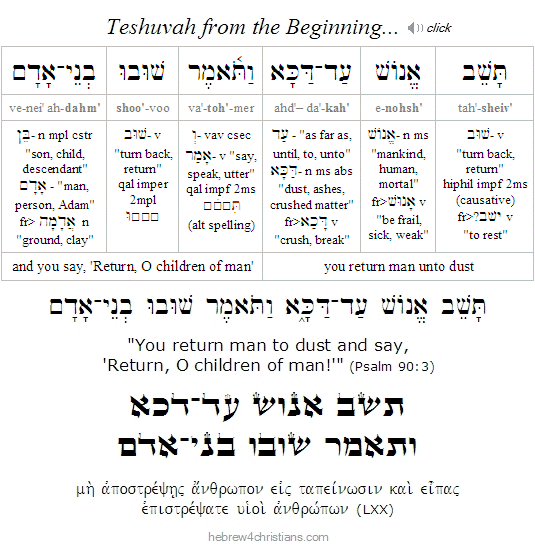 |
Shavuah Tov Podcast:
Parashat Ki Teitzei...

08.15.21 (Elul 7, 5781) Shavuah tov, chaverim. Our Torah reading for this week (i.e., parashat Ki Teitzei) identifies 74 of the Torah's 613 commandments (more than any other), covering a wide assortment of laws related to warfare, family life, property laws, the humane treatment of animals, fair labor practices, and honest economic transactions, and more. The portion is always read during the month of Elul, and therefore it provides an opportunity for us to review the importance of the law in relation to the theme of teshuvah (i.e., repentance).
Parashat Ki Teitzei - כי־תצא

[ This week's Torah reading (parashat Ki Teitzei) is always read during the month of Elul... ]
08.15.21 (Elul 7, 5781) Shavuah tov v'chodesh tov, chaverim. If you are following the weekly Torah schedule, you will recall that in last week's Torah reading (i.e., Shoftim), Moses defined an extensive system of justice for the Israelites and pointed to the coming Messiah who would be the rightful King of Israel: "The LORD your God will raise up for you a prophet like me from among you, from your brothers -- it is to him you shall listen" (Deut. 18:15). In this week's portion (i.e., Ki Teitzei: כי־תצא), Moses returns to the immediate concern of life in the promised land by providing additional laws to be enforced regarding civil life in Israel. In fact, Jewish tradition (following Maimonides) identifies no less than 74 of the Torah's 613 commandments in this portion (more than any other), covering a wide assortment of rules related to ethical warfare, family life, burial of the deceased, property laws, the humane treatment of animals, fair labor practices, and honest economic transactions.
Of particular interest to us is the statement that a man who was executed and "hanged on a tree" (עַל־עֵץ) is cursed of God (Deut. 21:22-23). According to the Talmud (i.e., Nezakim: Sanhedrin 6:4:3), the Great Sanhedrin (סַנְהֶדְרִין גְדוֹלָה) decided that "a man must be hanged with his face towards the spectators" upon a wooden stake, with his arms slung over a horizontal beam. It should be noted that while this is technically not the same thing as the gruesome practice of Roman crucifixion, the reasoning based on this verse was apparently used to justify the execution of Yeshua (Mark 15:9-15; John 19:5-7; 15). The exposed body was required to be buried before sundown to keep the land from being defiled. Besides the shame and degradation of this manner of death, the one so executed would be unable to fall to their knees as a final act of repentance before God, thereby implying that they were under the irrevocable curse of God (קִלְלַת אֱלהִים).
In this connection, we should note that Yeshua was falsely charged with blasphemy before the corrupt Sanhedrin of His day (Matt. 26:65; Mark 14:64; John 10:33) - an offence that was punishable by stoning (Lev. 24:11-16). However, since the Imperial Roman government then exercised legal hegemony over the region of Palestine, all capital cases were required to be submitted to the Roman proconsul for adjudication, and therefore we understand why the Jewish court remanded Yeshua and brought him to be interrogated by Pontius Pilate. Because Roman law was indifferent to cases concerning Jewish religious practices (i.e., charges of blasphemy), however, the priests further slandered Yeshua by illegitimately switching the original charge of blasphemy to that of sedition against Rome. The Sanhedrin undoubtedly rationalized their duplicity because the Torah allowed for an offender to impaled or "hung on a tree" (Num. 25:4), and since they were unable to do carry out this judgment because of Roman rule in the area, they needed Pilate to condemn him to death by crucifixion (Matt. 27:31; Mark 15:13-4; Luke 23:21; John 19:6,15). Note that crucifixion is mentioned elsewhere in the Talmud (Nashim: Yevamot 120b) regarding whether a widow can remarry if her husband had been crucified, as well as by the Jewish historian Josephus. The Talmud furthermore alludes to the death of Yeshua where Yeshua is said to have been crucified on "eve of Passover" (Nezekin: Sanhedrin 43a).
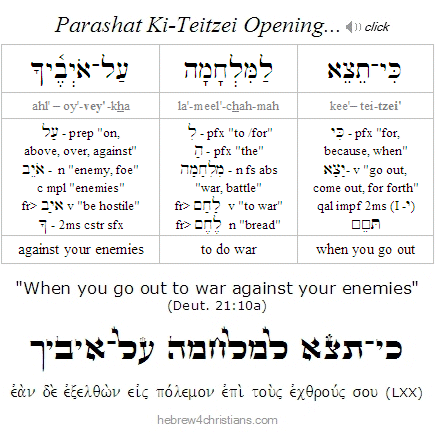 |
Focus of the heart...

08.13.21 (Elul 5, 5781) The Scriptures warn that a "double-minded person is unstable in all his ways" (James 1:8). The word translated "double-minded" is dipsuchos (δίψυχος), which literally means having "two souls." A double-minded man is full of inner conflict and indecision; he's like the proverbial "divided house" that cannot stand. The way to be healed of a divided heart is to earnestly make a decision: "Draw near to God, and he will draw near to you" (James 4:8). There are no conditions given here -- other than your raw need to connect with God for help. "Purify your hearts, you double-minded ones" (δίψυχοι, lit. "two-souled ones"); make up your mind and be unified within your heart: "How long will you go limping between two different opinions?" (1 Kings 18:21). You are invited to come; God has made the way; your place at the table has been set and prepared. "Let us draw near with a sincere heart in full assurance of faith (ἐν πληροφορίᾳ πίστεως), with our hearts sprinkled clean from an evil conscience and our bodies washed with pure water. Let us hold fast the confession of our hope without wavering, for he who promised is faithful" (Heb. 10-22-23).
The Lord responds to those who sincerely cry out to him (Psalm 145:18). He is "near to the brokenhearted and saves the crushed in spirit" (Psalm 34:18). Indeed, salvation is as close as your own mouth and heart (Rom. 10:8-13). But how many are the days of your life? How many opportunities for you to make up your mind? "How long will you go limping between two opinions?" Therefore choose this day whom you will serve. Make the first step; open your heart, and the LORD will then help you make the wholehearted decision to "seek the LORD while He may be found; call upon Him while He is near." Amen.
Deliverance from Death...

[ "Resolved, to think much on all occasions of my own dying, and of the common circumstances which attend death..." - Jonathan Edwards ]
08.13.21 (Elul 5, 5781) There is the great danger of squandering and dissipating our lives... Examine yourself; consider what really moves you. Be careful not to deceive yourself by "reasoning around the truth" (i.e., παρα + λογίζομαι), as James the Righteous puts it (James 1:22). Many people fool themselves by assuming they know or understand what is good, but they confine this ideal to a matter of opinion rather than experiencing it as a matter of the will (or they confuse their opinion of the ideal with what is real). Some of the ancient Greek philosophers assumed that moral evil was the result of ignorance, and that simply knowing the good would lead to doing the good. For example Socrates states (in the Protagoras) that no one knowingly does the wrong thing, and therefore all evil is the result of ignorance. He argues this way because he assumes that doing wrong harms the soul, and since no one willingly acts against his own interests, wrongdoing must be result of ignorance. This optimistic view implies that the answer to the problem of moral evil is "education," or leading people out of the dark cave of their lower nature to experience the light of reason. If we just really understood why doing this or that sinful thing hurts us, we would change our ways and repent, or so the theory goes... Alas, human experience proves that such "head knowledge" often does not change the way we choose, and we all know people who have habits they realize are harmful but continue to indulge in them anyway.
There may be some truth to the idea that evil is a matter of ignorance however, since ignoring what is good, being indifferent, apathetic, and cynical is a defect of character (ἀκρασία), and learning to be honest, upright, courageous, unselfish, and so on, requires personal struggle to make the "ought" of moral reality an expression of the "is" of inner life. What is often most shocking about moral evil is that it expresses apathy or indifference toward the objections of conscience. Moral evil is essentially heartless and devoid of empathy, a state of cold-heartedness and callousness for the feelings and dignity of others. According to the Jewish philosopher Hannah Arendt, the lack of moral thought and reflection creates what she called the "banality of evil," that is, the unthinking acceptance of evil so that it is no longer regarded as outrageous or strange. People deaden their conscience by refusing to honestly engage questions such as: "What is goodness?" "Is evil real?" "Do we have an obligation to observe moral truth?" "What is the good life?" "How should we live?" "Do our actions really matter?" "Will God judge my life?" and so on. On the other hand, our culture has been so shocked by the ongoing practice of lawlessness wickedness that people have lost their sense of shame. We are no longer shocked and outraged when we hear of the latest crimes or abuses of power in our postmodern world.... We must be careful, however, not to become evil by despising what is evil. For instance, we may feel so outraged and threatened by the evil actions of others that we deny their humanity, thereby becoming the very thing we hate.
"The heart is deceitful above all things and desperately sick; who can understand it?" (Jer. 17:9). "Oh there is nothing as deceitful and as cunning as a human heart, resourceful in seeking escapes and finding excuses; and there surely is nothing as difficult and as rare as genuine honesty before God." (Kierkegaard: Discourses). Therefore we pray: "Heal me, O LORD, and I shall be healed; save me, and I shall be saved.. Be not a terror to me; you are my refuge in the day of evil" (Jer. 17:14, 17).
Hebrew Lesson:
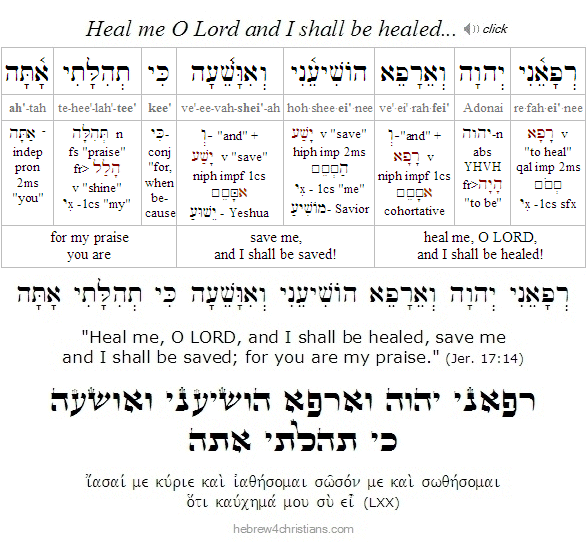 |
Teshuvah and Healing...

08.13.21 (Elul 5, 5781) The biblical Hebrew word for healing is refuah (רְפוּאָה), from the root rapha (רָפָא), meaning to repair, restore, or make healthful. Some of the sages have said that the root letters indicate the meaning or essence of healing itself, namely, confessing the truth of God. This can be seen when we consider that the letter Resh (ר) refers to the head (i.e., rosh: ראשׁ), or that which is first -- suggesting that thinking and the will to do teshuvah (Psalm 90:2-3) is primary; the letter Pey (פּ) refers to the mouth (i.e., peh: פֶּה), that is, to speech, confession, and prayer; and the letter Aleph (א) refers to faith (אמונה) in the LORD (i.e., ehyeh: אֶהְיֶה), the One and only true God who is the Master of the universe (Exod. 3:14). So we can see how the Hebrew word for healing is connected first with changing our thinking by doing teshuvah, confessing our sin, and finally trusting God for life, as it says, "confess your sins to one another and pray for one another, that you may be healed" (James 5:16), and "I considered my ways, and turned my feet unto Thy testimonies" (Psalm 119:56).
Refuah shleimah (רְפוּאָה שְׁלֵמָה), or a complete healing, is ultimately found when we turn to God with all our hearts and find his shalom (שָׁלוֹם), as it says, "the Torah of the LORD is perfect, returning the soul" (Psalm 19:7). The Hebrew word for sickness (i.e., choleh: חוֹלֶה), on the other hand, comes from a root (חלה) that stands for blocked (חָסום) or profane (חל) learning (לִמוּד) of the Holy Spirit (ה). The LORD comes to seek and to save those who are lost, saying "I am your Healer" (אֲנִי יְהוָה רפְאֶךָ). Therefore confess your confidence that he forgives all your iniquities and heals everything that blocks you from his blessing. Amen.
Hebrew Lesson:
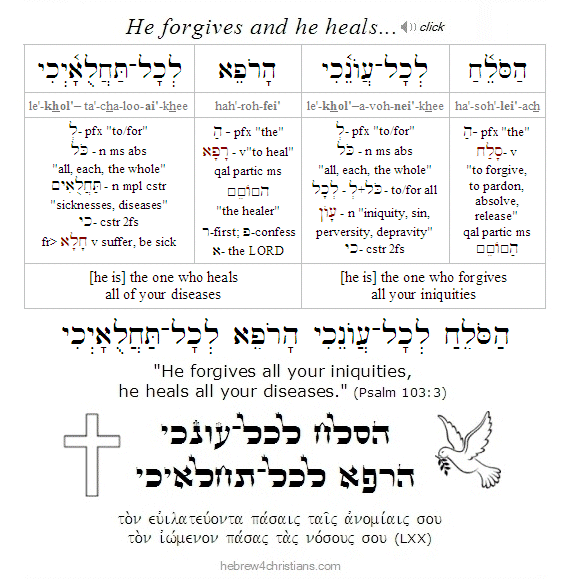 |
Yearning for Heaven...

08.13.21 (Elul 5, 5781) It is an ongoing struggle to live in this world without being devoured by its fear, insanity, and violence. Yeshua prayed for his followers saying, "I am not asking you to take them from the world but to keep them from the evil one. They do not belong to the world any more than I belong to this world" (John 17:15-16). To live in the world without belonging to the world marks the life of the tzaddikim (righteous ones) who are seeking the house of love, the place where God abides. Even though we are given "traveling mercies" for our journey in this world, we must lift our heart toward heaven, desisting the world and its vanities, and regarding the place of God's heart to be our true home. Abraham closed his eyes to this world and was given the inner light of truth that would reveal his way to God. "By faith Abraham obeyed when he was called to go out to a place that he was to receive as an inheritance. And he went out, not knowing where he was going. By faith he sojourned in the land of promise as in a strange land, living in tents with Isaac and Jacob, heirs with him of the same promise. For he was looking forward to the city that has foundations, whose designer and builder is God" (Heb. 11:8-10). For here we have no lasting city, but we seek the city that is to come (Heb. 13:14). So lift up your soul unto the LORD and refuse to live in fear. Stand strong in faith, trusting God's promise even if you are in darkness. As it is written: "Blessed is the one who makes the LORD his trust" (Psalm 40:4).
Hebrew Lesson:
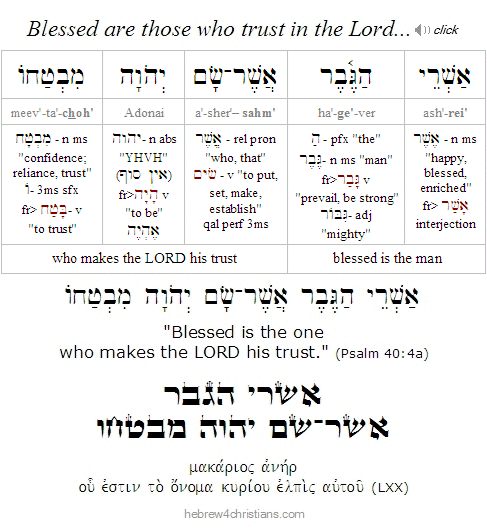 |
Being Made Whole with God...

08.13.21 (Elul 5, 5781) In our Torah portion for this week (i.e., Shoftim) we read: "You shall be wholehearted with the LORD your God" (Deut. 18:13). Note that the word "wholehearted" in this verse (i.e., tamim: תָּמִים) is often translated as "perfect" or "blameless" in many Bible versions, though it is better to understand the word to connote being made "complete" or "whole."
When God said to Abraham, "I am El Shaddai; walk before me and be tamim (Gen. 17:1), he was not saying "be perfect" or "don't ever make a mistake," but rather be fully engaged, that is, to walk before God passionately, sincerely, with all his heart, and by doing so to "walk out" the relationship with full assurance that he is accepted and beloved by God. Likewise when Yeshua said "Be therefore perfect as your Father who is in heaven is perfect" (Matt. 5:48), he meant that we should be complete, finished, and "made whole" by knowing and receiving the overflowing love and light of God.
"You shall be wholehearted with the LORD your God" therefore is a mandate to know who you are, to know what is truly good as distinguished from what is evil, and to be united with God's passion to be healed from your inner conflicts and ambivalence (δίψυχος). We are made "whole" or "perfect" (i.e., complete) when we resolutely turn to God for healing of what divides our hearts, as it says: "The Torah of the LORD is perfect (תָּמִים), returning the soul" (Psalm 19:8). Understand the Torah's commandment, then: "You shall be tamim (i.e., whole and wholehearted) with the LORD your God," to be a prophecy of transformation for your life, friend... Amen: May you know "the love of Messiah that surpasses knowledge and be filled with all the fullness of God" (Eph. 3:19).
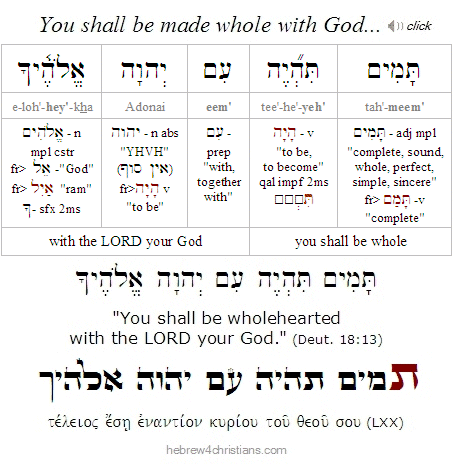 |
Note: In the Sefer Torah (i.e., the handwritten Torah scroll), the first letter of the word tamim ("wholehearted") is written extra LARGE in order to emphasize the importance of the word. Notice also the little word "with" (עִם) that follows in this verse. This hearkens to Micah 6:8: "What does the LORD require of you except to do justice (mishpat), and to love mercy (chesed), and to walk humbly (hatznea lechet) with your God?" Having a humble heart walks with the LORD. Humility begins with the awareness that 1) there is a God and 2) you are not Him.... It is the practice of da lifnei mi attah omed: "knowing before whom you stand" and living your life in light of this fundamental truth.
Hebrew Lesson:
Getting the Name Right...

08.12.21 (Elul 4, 5781) I sometimes get emails from people confused about the "real" name of God. Is it Yahweh? Jehovah? Yahoshua? or perhaps something else? Is "Jesus" a pagan name that comes from "Zeus"? and so on... Sadly there is a lot of nonsense taught about the name of the LORD floating around out there, often by people who dabble in Hebrew and believe they have gained some esoteric wisdom.... Such false teachers promote some "secret" way to pronounce the name of God, as if it were a "shibboleth" or password to access his presence, and consequently they focus on the superficial rather than the substance. Those who are wise, on the other hand, search for the deeper significance and that which must be spiritually discerned...
We must remember that the most common name of God given in the Hebrew Scriptures is "YHVH" (יהוה) which is clearly wordplay on the verb "hayah" (היה), meaning "to be" (Exod. 3:14-15). I have written about this many times before, and there are several articles on this site that deal with this issue decisively, but for this short post let me simply remind you that God's name YHVH is "ineffable" and mysterious, a word that cannot be defined, because a definition requires that the "definiens" (i.e., the group of words that define something) to be equivalent to the "definiens" (i.e., the word or term to be defined). The Scriptures teach, however, that the LORD is unrivaled, matchless, without peer, infinite, and utterly unique (Exod. 15:11; Psalm 89:6; Psalm 113:5-6). There is categorically nothing in the likeness of finite reality to whom the LORD can be likened: No amount of words can fully explain who He is, the depths of His character, or the power of His life (Psalm 147:5). Moreover - and as alluded by the verbal wordplay on the name YHVH (i.e.,אהיה אשׁר אהיה) - it is a category mistake to think of YHVH as a "noun" or "thing" rather than as a "verb" or power... He is the "Living God" (אל־חי), alive, powerful, and the Source of all that exists. Therefore if God is to be known by us, we must look to the historical revelation of His creative and saving acts: "You have magnified Your word above all Your name" (Psalm 138:2), which means that God's fame and glory constitutes the very meaning of His Name.
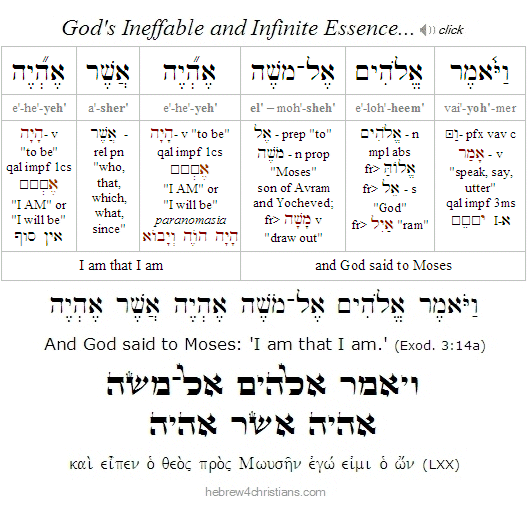 |
There are hundreds of names and titles of God in the Scriptures, each revealing something about the attributes and character of the LORD, and each is therefore worthy of study and appreciation. Ultimately, however, God is disclosed in the person of Yeshua, who embodies and gives expression to the very life and character of the divine. The advent of the Savior (מושׁיע) reveals the meaning of who God is. Indeed it is written in these "last days" God speaks to us "in Son" (ἐλάλησεν ἡμῖν ἐν υἱῷ), that is, by means of the revelation and language of Yeshua, who is "the radiance of the glory of God and the exact imprint of his nature (χαρακτὴρ τῆς ὑποστάσεως αὐτοῦ); Yeshua is the one who "upholds the universe by the word of his power" (Heb. 1:2-3). "For by Him (Yeshua) all things were created, in heaven and on earth, visible and invisible, whether thrones or dominions or rulers or authorities-- all things were created through him and for him. And he is before all things," καὶ τὰ πάντα ἐν αὐτῷ συνέστηκεν- "and in him all things hold together" (Col. 1:16-17; John 1:3). Yeshua is the "Name above all names" (ὄνομα τὸ ὑπὲρ πᾶν ὄνομα) the One before whom every knee shall bow and every tongue confess to be the LORD of Glory over all (Isa. 45:23; Phil. 2:9-10). His Name is Wonderful (פֶּלֶא), the Mighty God (אֵל גִּבּוֹר), the Everlasting Father (אֲבִיעַד), and the Prince of Peace (Isa. 9:6). "His eyes are like a flame of fire, and on his head are many diadems, and he has a name written that no one knows but himself. He is clothed in a robe dipped in blood, and the name by which he is called is 'The Word of God'" (Rev. 19:12-13).
It is interesting to note that though the ancient Greek language was capable of transliterating the Hebrew name YHVH, it was never done, not in the the Septuagint (i.e., the most ancient Greek translation of the Torah), nor in any of the manuscripts of the ancient Greek New Testament, where the name "ho theos" (ὁ θεὸς) was used in place of YHVH (יהוה). We have no textual evidence that Yeshua ever used this Name (he apparently followed the practice of using the circumlocution of "Adonai"), though he did explicitly refer to Himself as none other than "ehyeh," the great I AM (see John 8:58). But Yeshua's most common name for God was simply "Father" (πατήρ in Greek, אֲבִי or אַבָּא in Hebrew).
Knowing the Name of the LORD means being in a personal, vital, and all-important relationship with the truth. The Holy Spirit is called the Spirit of Truth (רוּחַ הָאֱמֶת). This means understanding God's character as "merciful and gracious, slow to anger, and abounding in steadfast love and faithfulness, extending kindness to the thousandth generation, forgiving iniquity, transgression, and sin" (see Exod. 34:6-7). Since the Hebrew idea of "word" (דָּבָר) is coextensive with truth (i.e., "being"), Yeshua is called the Word of God (דְּבַר אֱלהִים) who represents the Name of God to all who trust in Him (John 17:26, Heb. 1:3). Jesus (Yeshua) is the Name of God, the "life" of God, the "substance" of God, the "exact imprint and representation of His nature," and so on. Do not be deceived, chaverim: those who impugn the name of our Lord Yeshua thereby profane the very name of God.
Hebrew Lesson:
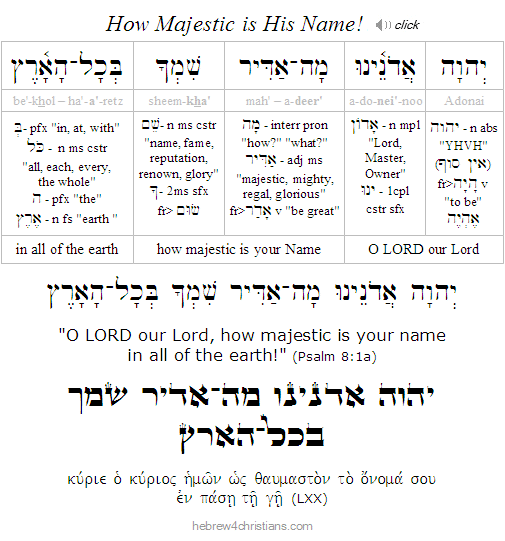 |
Teshuvah of Faith...
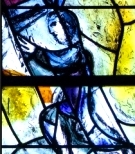
[ "Resolved, to live with all my might, while I do live." - Jonathan Edwards ]
08.12.21 (Elul 4, 5781) Teshuvah ("repentance") is an ongoing journey toward wholeness, and in this life we never fully arrive: we are always "on the road," and often we are in the dark... The way of teshuvah is therefore more of a question about how we walk the road than what the road is like or even where it may take us. As we turn to God, as we experience His claim on our lives and trust that we are His redeemed people, questions about "how" are revealed, one step at a time. We take up the cross daily, and in doing so we find ourselves on the road, even if we may not know where it is immediately taking us.
Hebrew Lesson
Isa. 50:10 Hebrew reading (click):
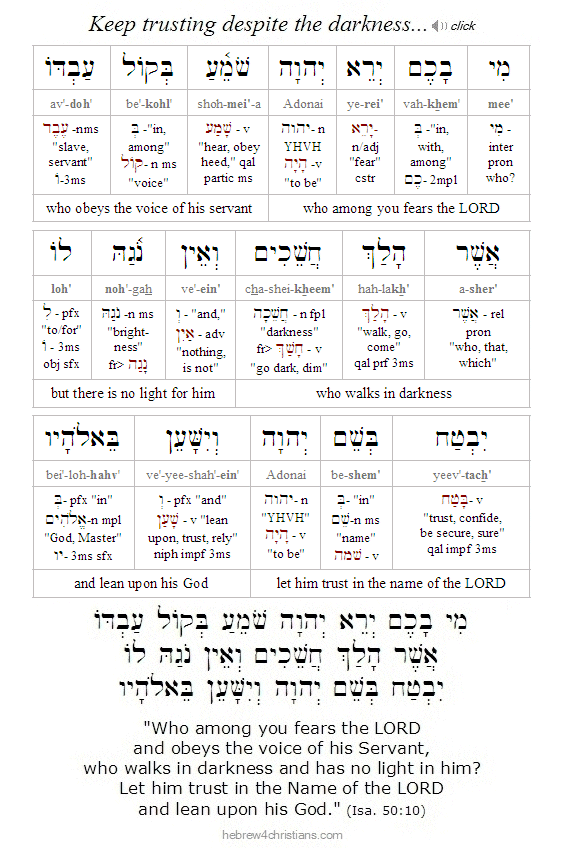 |
It is precarious to assume that a person who is walking in spiritual darkness must necessarily be outside of God's will, or that such a person is being punished by God. That, after all, was the karma-based theology delivered to Job by his "religious" friends... On the contrary, as Charles Spurgeon reminds us, "Spiritual darkness of any sort is to be avoided and not desired; and yet, surprising as it may seem to be, it is a fact that some of the best of God's people frequently walk in darkness; some of them are wrapped in a sevenfold gloom at times, and to them neither sun, nor moon, nor star appears. As the pastor of a large church, I have to observe a great variety of experiences, and I note that some of whom I greatly love and esteem, who are, in my judgment, among the very choicest of God's people, nevertheless, travel most of the way to heaven by night."
"My Lord God, I have no idea where I am going. I do not see the road ahead of me, I cannot know for certain where it will end. Nor do I really know myself, and the fact that I think I am following your will does not mean I am actually doing so. But I believe the desire to please you does in fact please you, and I hope I have that desire in all that I am doing. I hope that I will never do anything apart from that desire. And I know that if I do this you will lead me by the right road, though I may know nothing about it. Therefore, I will trust you always, though I may seem to be lost and in the shadow of death. I will not fear, for your are ever with me, and you will never leave me to face my perils alone." - Thomas Merton (Thoughts In Solitude)
Indeed, Yeshua himself entered into thick darkness for our sake, and he sometimes calls his followers go there, too (Col. 1:24). "Through struggle with his demons and the encounter with the LORD, Anthony had learned to diagnose the hearts of people and the mood of his time and thus to offer insight, comfort, and consolation. Such had made him a compassionate man." (Wisdom of the Desert Fathers)
There is a "center" or focus for life, however, and that is the cry of the heart for the LORD Himself. Therefore the LORD is called El Ne'eman (אֵל נֶאֱמָן), "the faithful God." His very Name means certainty, reliability, strength, truth, reality, presence, being, life, and so on... It follows from this that doubt is never from God, since the one who doubts is "driven like a wave of the sea and tossed" by the winds of change. We are given strength from heaven when we exercise bittachon (trust) that God is faithful and true, despite passing through the valley of the shadow of death itself. God abides with us during our sojourning. The LORD is the only enduring Reality in a constantly changing world, this world of flux and shadows, and He has designed it this way to cause men's hearts to search for him. "All flesh is grass, and all its beauty is like the flower of the field" - such is the condition of this ephemeral world and its fortunes. The flesh fades because the breath of the LORD blows (רוּחַ יְהוָה נָשְׁבָה) upon it (Isa. 40:7). God Himself has ordained human life to be a vapor (Psalm 39:5).
Nonetheless, despite the inescapable dissolution of life in this world, we are told not to fear, because there is good news for Zion: the LORD is coming with might to reward those who are waiting for him. He will tend his flock like a shepherd; he will gather his lambs and carry them close to his heart (Isa. 40:11). As the apostle Peter said, this good news is the eternal life given through the imperishable "seed" - the Word of God that rises forever in Yeshua (1 Pet. 1:23-25). May His Name be praised forever...
Hebrew Lesson
Isa. 40:8 Hebrew reading (click):
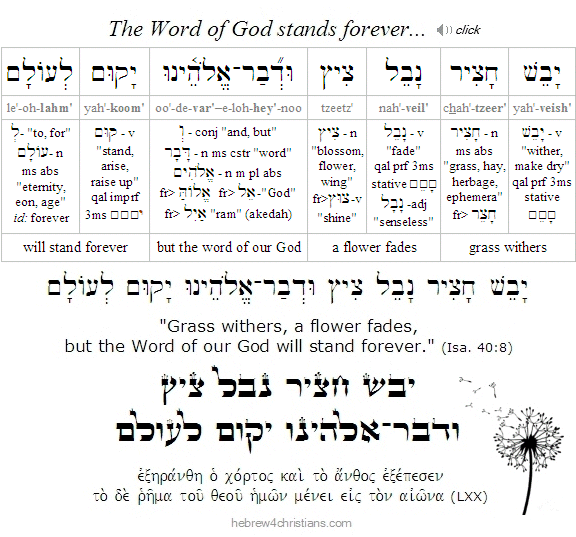 |
Torah of Teshuvah...

08.12.21 (Elul 4, 5781) Perhaps you (like me) once learned Psalm 19:7 as, "The law of the LORD is perfect, converting the soul." However, the Hebrew text might better be translated as, "The instruction (i.e., Torah) of the LORD is perfect, returning the soul." This is the message of teshuvah (תְּשׁוּבָה), or "repentance," of course. We turn away from ourselves to discover that only the love of God given in Yeshua gives life to our dead hearts (Mark 1:15). Teshuvah is therefore first of all a matter of faith, of trusting in the miracle of God. And though it is indeed a great gift from heaven, it requires that we pass through the "narrow gate" of humility by confessing the truth about who we are (Matt. 7:13). We turn away from our pride; we acknowledge our inner poverty, our neediness, and we mourn over the loss and hurt caused by our sin. Teshuvah turns us away from our attempts to defend or justify ourselves and instead turns to God to heal our separation from love (Rom. 8:3-4). The miracle of love buries our old nature and transforms us into a new creation (2 Cor. 5:17).
Hebrew Lesson:
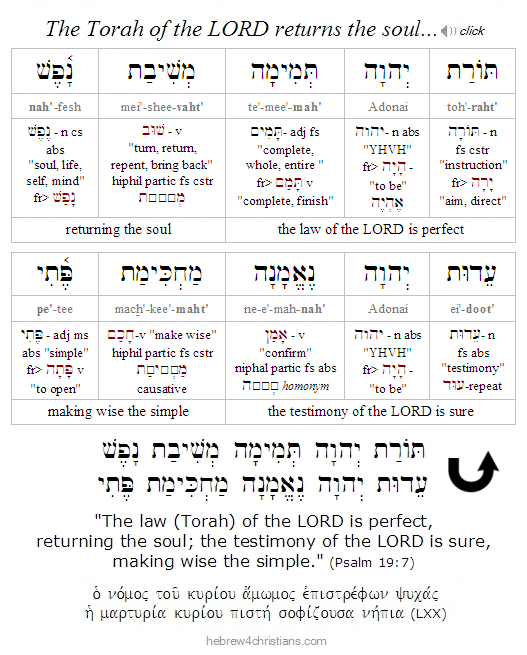 |
Teshuvah and Brokenness...
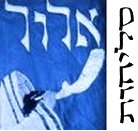
[ The following concerns the "Season of Repentance" which begins August 19th this year... ]
08.11.21 (Elul 3, 5781) The advent of the "Season of Teshuvah" reminds us that we all fail, that we all are broken people, and that errors and mistakes are part of our daily spiritual life... We journey toward humility rather than struggle for perfection; we confess our need for forgiveness and seek reconciliation with all those we might have harmed... During this season it is common enough to hear messages about our need to turn and draw near to God for life, but it is equally important to remember that God turns and draws near to the brokenhearted for consolation. As it is said, the Lord is near to the nishbar lev (נִשְׁבָּר לֵב), the one with a broken and crushed heart (Psalm 34:17).
Brokenness is the means through which God performs some of His deepest work within our hearts. A.W. Tozer once said, "It is doubtful whether God can bless a man greatly until he has hurt him deeply." Likewise Alan Redpath once wrote, "When God wants to do an impossible task, he takes an impossible individual – and crushes him." William James called this deep work of the spiritual life Zerrissenheit, a term that roughly can be translated as "torn-to-pieces-hood," or a state of being utterly broken and in disarray... The brokenhearted live in day-to-day dependence upon God for the miracle...
"Resolved, to act, in all respects, both speaking and doing, as if nobody had been so vile as I, and as if I had committed the same sins, or had the same infirmities or failings as others; and that I will let the knowledge of their failings promote nothing but shame in myself, and prove only an occasion of my confessing my own sins and misery to God." - Jonathan Edwards
Hebrew Lesson:
Torah's Weightier Matters...
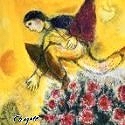
08.11.21 (Elul 3, 5781) Shalom friends. We read in the Torah: "See, I am setting before you today a blessing and a curse: the blessing (הַבְּרָכָה), if you obey (שָׁמַע) the commandments of the LORD your God... and the curse (הַקְּלָלָה), if you turn aside (סוּר, "withdraw," "draw back") from the way that I am commanding you today, to go after other gods that you have not known" (Deut. 11:26-28). Presupposed here, of course, is knowing what the commandments of the Lord are, which is why we are further commanded neither add nor to subtract from Torah (Deut. 4:2). We are neither to go back to passivity and slavery by making Torah another "taskmaster" (i.e., "adding" to Torah), nor are we to erect "private altars" by exalting our own interpretation as exclusionary and divine (i.e., "subtracting" from Torah) (Deut. 12:1-7). Instead, we must face up to our responsibilities by making difficult life choices: we must discern the "weightier matters of Torah" (see Matt. 23:23). When we were enslaved in Egypt, we were free from responsibility; we could play the victim by blaming others for our sins, our sorrows, our troubles. When were set free to serve God, however, we were given the power to choose to live outside of the realm of the curse by accepting God's blessing. Therefore choose life so you and your offspring may live!
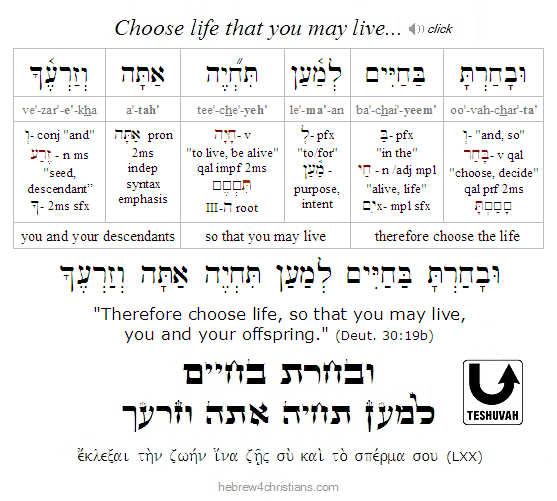 |
Faith in Perilous Times....

[ Back in March of 2020 -- over 18 months ago now -- I had forewarned of the danger of the rise of fascism based on the engineered threat of Covid-19, and here we are today, with the stage set for rise of the "Man of Sin" and the advent of the End of Days.... ]
08.11.21 (Elul 3, 5781) Shalom friends. For the last year and a half we have seen the world in a state of confusion and dread over of the Coronavirus (i.e., Covid-19), particularly because of the mixed messages and disinformation propagated by the mass media about its "polymorphous" threat. Because of this uncertainty, however, various governmental agencies have arrogated dictatorial powers, and such overreach has resulted in forced lockdowns of various public places, the suspension of civil liberties, massive unemployment, the implosion of the private sector economy, among other things. In a matter of months a radical revolution has taken place, wherein the once great United States of America has devolved into a fascist state that surveils not only the behavior of its "citizens," but now their very biochemistry as well... In today's climate of irrational fear, you can be labeled an "enemy of the state" simply for asking for justification regarding the latest "official edict" handed down by unaccountable overlords. The relentless propaganda campaign has had a "totalizing" effect on the culture: those who dare to question the efficacy of masks or the safety of untested mRNA vaccines, for example, face social ostracism ("banning"), job loss, and even threats of violence. The chill of political suppression and tyranny is in the air.
In light of this political situation - and the cultural rot that marks the thinking of the world today - we need logical clarity and courage to face reality. As I have said many times over the years, the important thing is not to "lose your mind" by forgetting what is real... In this audio podcast (recorded back in March of 2020) I discuss the struggle of faith and how we find peace by accepting the sovereignty and greatness of the LORD. I hope to remind you that Adonai Tzeva'ot, the LORD over all, has matters completely in hand, and to find faith that He will help you persevere in these days of testing.
God allows the wicked to rise in order to test his people... God's strength however, is made perfect in weakness, and therein lies the paradox: "Lord, we do not know what to do, but our eyes are upon You" (2 Chron. 20:12). The battle belongs to the Lord!
Hebrew Lesson:
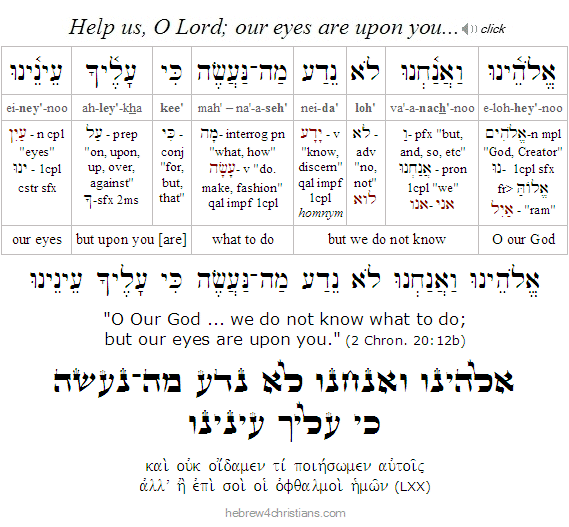 |
|
























































